This website uses cookies to ensure you get the best experience on our website. Learn more


Information on how to stay safe and healthy abroad. About us.
- Destinations
- Europe & Russia
- Asia (Central)
- Asia (East)
- Australasia & Pacific
- Central America
- Middle East
- North America
- South America & Antarctica
Albania (Europe & Russia)
Advice for all destinations.
Read the information on the COVID-19: Health Considerations for Travel page for advice on travelling during the COVID-19 pandemic.
Vaccinations and malaria risk
Review both the Vaccination and Malaria sections on this page to find out if you may need vaccines and/or a malaria risk assessment before you travel to this country.
If you think you require vaccines and/or malaria risk assessment, you should make an appointment with a travel health professional:
- How to make an appointment with a travel health professional
A travel health risk assessment is also advisable for some people, even when vaccines or malaria tablets are not required.
- Do I need a travel health risk assessment?
Risk prevention advice
Many of the health risks experienced by travellers cannot be prevented by vaccines and other measures need to be taken.
Always make sure you understand the wider risks at your destination and take precautions, including:
- food and water safety
- accident prevention
- avoiding insect bites
- preventing and treating animal bites
- respiratory hygiene
- hand hygiene
Our advice section gives detailed information on minimising specific health risks abroad:
- Travel Health Advice A-Z
Other health considerations
Make sure you have travel insurance before travel to cover healthcare abroad.
Find out if there are any restrictions you need to consider if you are travelling with medicines .
Know how to access healthcare at your destination: see the GOV.UK English speaking doctors and medical facilities: worldwide list
If you feel unwell on your return home from travelling abroad, always seek advice from a healthcare professional and let them know your travel history.
Vaccinations
- Confirm primary courses and boosters are up to date as recommended for life in Britain - including for example, seasonal flu vaccine (if indicated), MMR , vaccines required for occupational risk of exposure, lifestyle risks and underlying medical conditions.
- Courses or boosters usually advised: Tetanus.
- Other vaccines to consider: Hepatitis A; Hepatitis B; Rabies; Tick-borne Encephalitis.
- Selectively advised vaccines - only for those individuals at highest risk: none.
Yellow fever vaccination certificate required for travellers aged 1 year or over arriving from countries with risk of yellow fever transmission .
Notes on the diseases mentioned above
Risk is higher where personal hygiene and sanitation is poor.
Risk is higher for long stays, frequent travel and for children (exposed through cuts and scratches), those who may require medical treatment during travel.
- Tetanus : spread through contamination of cuts, burns and wounds with tetanus spores. Spores are found in soil worldwide. A total of 5 doses of tetanus vaccine are recommended for life in the UK. Boosters are usually recommended in a country or situation where the correct treatment of an injury may not be readily available.
- Tick-borne Encephalitis : spread mainly through tick bites. Risk is higher during the warmer months between spring to autumn. Spending long periods of time outdoors in forests or rural areas whilst undertaking outdoor activities such as camping, rambling or mountain biking increases your risk.
- Malaria not normally present unless the illness was contracted abroad.
Other Health Risks
Altitude and travel.
There is a risk of exposure to coronavirus (COVID-19) in this country.
Please be aware that the risk of COVID-19 in this country may change at short notice and also consider your risk of exposure in any transit countries and from travelling itself.
- The 'News' section on this page will advise if significant case increases or outbreaks have occurred in this country.
Prior to travel, you should:
- Check the latest government guidance on the FCDO Foreign travel advice and country specific pages for travel to this country and the rules for entering the UK on return.
- Ensure you are up to date with UK recommendations on COVID-19 vaccination.
- You can check this in the FAQ's.
- If you are at increased risk of severe COVID-19 you should carefully consider your travel plans and consider seeking medical advice prior to making any decisions.
For further information, see Coronavirus disease (COVID-19) and COVID-19: Health Considerations for Travel pages.
- 47 additional items in the news archive for this country
back to top
Wander-Lush
22 Travel Tips for Albania: Useful Things to Know Before You Go
My top travel tips for Albania to save you money, time and stress. Read this before you go travelling in Albania.
When I embarked on my 6-month overland journey through the Balkan countries, Albania was definitely the country I was most nervous about visiting.
I had read all about the rugged beaches , high mountains and historic towns and castles – so I had no trouble deciding where to go and what to do . But the people, the culture, the food and all the practical details such as transportation, WIFI and accommodation – well, I had absolutely no clue what to expect.
On the ground, I discovered that most negative stereotypes about the country are untrue. In my experience Albania is safe, affordable, friendly, diverse, tolerant and above all else, incredibly beautiful .
At the same time, I learned that Albania does present some particular challenges , even for those well-practiced at travelling in the region.
Without spoiling any of the country’s special secrets or revealing too many of the quirky things about Albania that are fun to figure out as you go, I want to share a couple of things that will make your travel experience smoother and more fulfilling.
Here are 22 practical travel tips for Albania that I think every traveller should know.
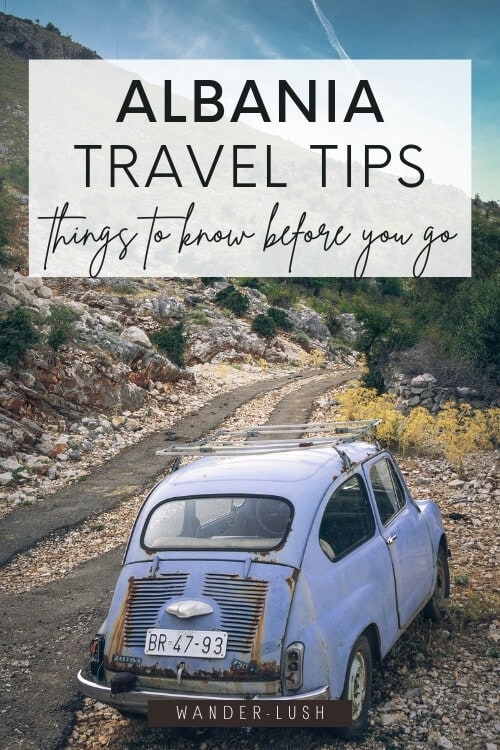
Please note: This post contains affiliate links, meaning I may earn a commission if you make a purchase by clicking a link (at no extra cost to you). Learn more.
What is travelling in Albania really like? 22 useful travel tips for Albania
Albania is quite unlike any of its neighbours.
It’s tempting to think of the Balkans (particularly the western Balkans) as a monolith. But I don’t need to tell you that every country is its own entity. Within this tapestry, Albania is perhaps the most distinct nation in terms of both its culture and history.
An obvious example: The Albanian language, Shqip , is unlike anything else spoken in the region (or anywhere else in the world for that matter). It’s thought to be descended from an extinct Illyrian tongue, but its exact origins are still a mystery to linguists.
After months of being able to follow the rough contours of a shared speech in Croatia, Montenegro and Bosnia and Herzegovina , hearing the curious chatter of Albanian on the streets of Tirana was quite a contrast.
Albania’s cultural and religious traditions are also very distinct. And although you can find local variations of cevapi and burek, the cuisine is totally different too!
With the exception of Kosovo where almost 93% of the population are ethnically Albanian, it’s hard to draw a comparison between Albania and any of its neighbours. In many ways Albania feels more like Georgia – slightly chaotic but imminently beautiful, with the furgon the local equivalent of the marshrutka.
Learn a bit about the history before you go
Of course this runs much deeper than just food and minivans. Albania wasn’t part of Yugoslavia and doesn’t have the same ‘baggage’ as its northern neighbours. That’s not to say the nation wasn’t impacted by the Balkan Wars and genocide – it certainly was – but in a different way. No fighting took place on Albanian soil.
Instead, Albania was subjected to its own private horrors, namely 45 years under an oppressive political regime including 30 years with despotic communist dictator, Enver Hoxha, at the helm. Hoxha’s ideology was so hardline, he viewed Yugoslavia and the USSR as too lax. It’s very difficult for an outsider to try and comprehend how this period of history impacted Albania and its people. But I felt compelled to at least try.
One of the most interesting things I found is that Albanians embrace their whole history – the good and the bad. The communist regime only fell in the 1990s so for the majority of the population, it’s not a distant memory but something that’s still very fresh. But it’s never glossed over. Most people we met were happy to chat politics and share their experiences.
For example: There are 173,000 disused nuclear bunkers sprinkled around Albania, each a monument to Hoxha’s paranoia. Instead of destroying them, people decided to either leave them be or repurpose them as museums or galleries. (Now there’s even a Cold War military base that’s being rebranded as an island destination .) Tirana’s collection of Communist-era statues and busts are displayed in a courtyard behind the National Art Gallery. And Blloku, once an exclusive neighbourhood where the party members lived, has been reclaimed as a vibrant cafe and street art district. Even Hoxha’s old house is still standing.
Some might think of Albania as a dark tourism destination. To me, this is a nation of light and colour. While visitors have an obligation to familiarise themselves with the nation’s recent history, it’s important to do so in a respectful, thoughtful way. The Bunk’Art museums in Tirana are a great place to start and will enrich your experience immensely.
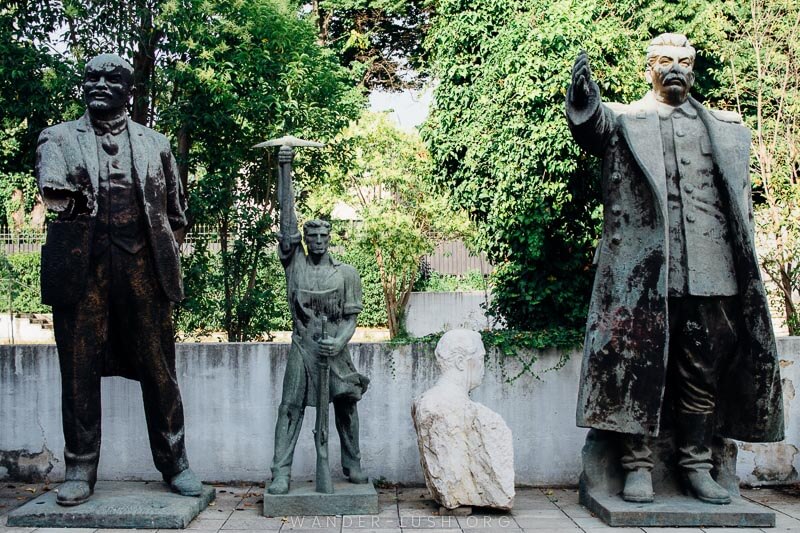
The man atop the horse is General Skanderbeg
On a lighter note, here’s a bit of trivia for you. If Hoxha is Albania’s villain, then the nation’s hero is definitely Gjergj Kastrioti Skënderbeu, AKA General Skanderbeg.
It took me far too long to learn who Skanderbeg is and why he’s so beloved in this part of the world. As I travelled around the Balkans, I kept seeing the same statue of a warrior – including in squares in Skopje and Prishtina – and started referring to him simply as ‘the man atop the horse’. It wasn’t until I got to Albania that I was finally able to put a name to the face.
Skanderbeg was an Albanian military commander who lived during the early 15th century. He’s famous for leading a campaign against the Ottomans which freed Albania and several neighbouring countries from being vassal states. His penultimate battle was launched from the town of Kruja north of Tirana, now the location of Skanderbeg’s castle-museum. It’s a popular day trip and the place to go if you want to learn more about this chapter of history.
The only other person held in similar esteem is Albania’s heroine, Anjezë Gonxhe Bojaxhiu, AKA Mother Teresa. Born to Albanian Kosovar parents in Skopje – then part of the Ottoman Empire and now the capital of North Macedonia – she’s beloved in all three countries (though each claims her as their own!).
Albania is overwhelmingly a safe country for tourists
One of the biggest misconceptions about Albania is that it’s unsafe for tourists. In reality, foreigners are very rarely the target of violent crime, and although pickpocketing and scams do happen, they’re not as widespread as in other countries in Europe.
Generally speaking, Albania is overwhelmingly safe for travellers of all types (including solo females) provided you exercise common sense and caution.
My one negative experience in Albania was being fleeced by a taxi driver in Gjirokaster . It was my mistake for not doing my research – I was unfamiliar with the location and agreed to a price without understanding just how short the distance to my hotel was. To avoid misunderstandings within the cities, it’s best to download a taxi app .
The biggest thing to watch out for in Albania is road safety. (Here we find another similarity to Georgia: The driving style.) More on that later.
As a side note: It’s not advisable to drink the tap water in Tirana or other cities/towns.
Avoid visiting in July or August
The best time to visit Albania in my opinion is any time except summer. I travelled during June. As the month went on and my trip was coming to an end, I found most places were getting a little too warm and dry – and much too crowded – for my liking.
Albania has a Mediterranean climate, thus winters are mild but wet. The best time to visit Albania is shoulder season (late March to early June or September through October) when the weather is pleasant both on the coast and in the mountains.
July and August are hot and busy, especially on the riviera, and should be avoided. That’s unless you plan to stick to the mountains, in which case summer is the best time for trekking.

Consider flying into a neighbouring country
Most people arrive in Albania via the country’s main international airport, Tirana Airport Nënë Tereza. This makes sense if your itinerary starts in the capital or in the northern part of the country.
A second international airport opened in July 2021 in Kukës (KFZ), 150km north-east of Tirana (and just 45-minutes from Prizren in Kosovo ). It’s a suitable starting point for the Albanian Alps, but international arrivals are so far limited to flights from Zurich and Istanbul.
If you’re travelling around the south of Albania, it might be more convenient (and more affordable) to fly into a neighbouring country instead. Corfu International Airport in Greece is a short ferry ride from Saranda, for example, and a logical place to arrive/depart if you’re mainly focusing on the Albanian Riviera.
Also read: My top tips for visiting Montenegro .
Lek is the official currency, but Euros are widely accepted
The official currency in Albania is the lek. Although Albania is not part of the EU, the Euro is widely used as well.
Lek is common currency in convenience shops, at restaurants and among taxi drivers – i.e. for small purchases. You’ll find that most hotels and guesthouses list their prices in Euro, and it usually works out far better to pay for big-ticket items such as hotel bills and rental cars in Euro rather than lek. If you try to pay in lek, you risk losing a big chunk of cash due to the conversion rate.
At the time of writing, 1 Euro is equivalent to 121.5 LEK.
Always have cash on you
Albania is very much a cash society so you need to make sure you have plenty of bills on you at all times. You can get by in Tirana using card only, but outside the capital, cash is still king.
Lek is a closed currency so you’ll have to wait until you arrive in-country to get your hands on some. Remember that lek is only good for small purchases and meals, so only withdraw as much as you need.
ATMs are easy to find in Albania (even in rural areas). Most banks charge a 300-700 lek withdrawal fee, but Credins Bank and Alpha Bank are among those that are fee-free (at the time of writing). Remember to check for any extra charges issued by your home bank.
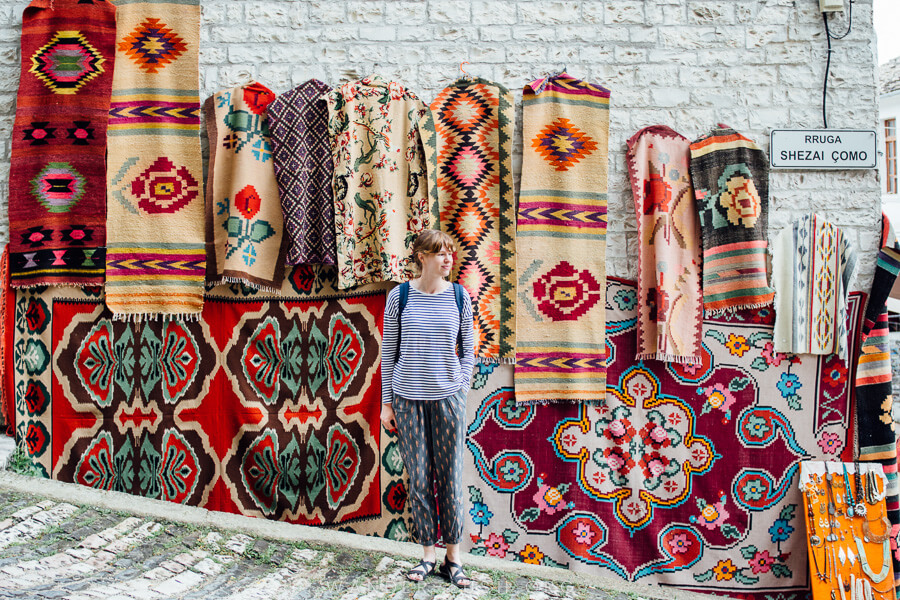
Albania is extremely affordable – even by Balkans standards
Accommodation, restaurants and activities in Albania are all extremely good value for money. We easily got by on 40 USD per person per day – and you could spend a lot less by taking advantage of the hostel scene and sticking to free activities. One of our biggest expenses was museum tickets, something we don’t tend to skimp on.
A generous meal in a restaurant in Albania might cost you 500-1000 lek per person, while cheap snacks such as burek are perfect for breakfast and will only set you back around 100 lek.
Expect to pay 1,600 lek for a local sim card with data, around 200 lek for a cup of coffee, and anywhere from 400-1,000 lek on average for an intercity bus fare.
Buy a sim card when you arrive
Majority of hotels, bars and restaurants in Albania have WIFI, while many beaches and archaeological sites are now serviced by a free public network. Still, if you want unfettered access to the internet for things like booking taxis and navigation, you will need a sim card.
ALBtelecom is the preferred mobile provider in Albania. It’s very easy to buy and register a sim card at one of their shops in Tirana using your passport/ID card. A sim card and internet package (20 GB with 30 days validity) will set you back 1,600 lek.
While coverage in Tirana is good enough to support a burgeoning digital nomad community, reception is still fairly limited in remote areas and non-existent in the mountains.
Don’t put your faith in Google Maps
If you’re getting around Albania with public transport and only using Google Maps for general navigation within the cities, then you have nothing to worry about. But if you’re driving in Albania and using Google Maps to plan your road trip route , you need to watch out for a couple of things.
It seems Google Maps hasn’t quite been able to keep pace with Albania’s rapid infrastructure developments. Missing roads and non-existent turn offs are common encounters, and you’ll find you’re constantly being forced to re-route. Take directions with a grain of salt and always budget extra time to account for detours.
The same goes for finding addresses – street names and house numbers often don’t correspond to what’s on the map. Even major landmarks are sometimes pinned in the wrong spot.

Furgons are your friends
Albania has a limited railway network connecting Tirana with Shkoder in the north, Durres and Vlore on the coast, and Pogradec on Lake Ohrid in the east. Domestic flights are now available from Tirana to Kukës, and flying can certainly save you time getting from the capital to the far-north.
Travelling around the centre and south of Albania, you’ll be relying on road transport. Renting a car is a great option if you’re a confident driver. Otherwise, furgons are your friends.
Furgons are intercity minivans similar to marshrutka vans used throughout the former Soviet countries . They run on a flexible schedule, stop on demand, and are extremely budget-friendly. The downsides: Road safety is not exactly a priority, luggage space (and legroom) is very limited, and you can forget about AC. Furgons depart when full so it’s important to always arrive at the bus station well ahead of schedule.
An upgrade on the furgon is the coach bus. You’ll find large air conditioned coaches running on most popular routes during the warmer months, including between Tirana and Berat , Kruje, Gjirokaster, Korca , Durres, etc.
Gjirafa Travel is a terrific website for checking bus schedules and timetables online in English. Whenever possible, I recommend cross-checking times locally at the station.
Speaking of bus stations – there are multiple bus terminals in Tirana and trying to figure out which one you need can be extremely confusing! Pogradec and Shkoder have their own stations, while other buses depart from the Regional Bus Terminal – North and South Albania.
Take extra care on the roads
Albanians have a reputation for their maniacal driving style and for flouting the rules of the road. Combined with poor road conditions in many parts of the country (although the major highways are in good nick) and the proliferation of old and worn-down cars on the road, it’s a recipe for disaster.
Be careful when crossing the road, especially in the city. Take precautions whenever you travel by road, and only hire a car if you’re very confident. Try to avoid being out on the road after dark, and never get into a car with someone who’s been drinking. I also recommend capping your road journeys to a couple of hours per leg.
Albanian cuisine is a revelation
Albania is not exactly known as a foodie destination , but it should be. Regional cuisine, traditional Albanian dishes and the country’s super-popular farm-to-table fresh food movement all combine to create a fascinating culinary scene.
Albanian food is so diverse, you can find something new to try every day. I was quite satisfied eating only Albanian food for the entire duration of my stay. I found Albanian food fresher and less meat-oriented than in some other countries in the region. Most restaurants have plenty of vegetarian options.
Northern, central and southern Albania all have their separate culinary traditions , and within that towns and villages have their own specialties. Balkan, Italian, Turkish, Greek and even ancient Roman influences can all be identified, while you’ll find many similarities to other Mediterranean cuisines (especially Greek and Italian).
Seafood reigns supreme on the coast, while in the south, food choices reflect the pastoral landscape: Dairy, citrus and olive oil are all prominent. Garlic and onions are ubiquitous.
Some of my favourite Albanian dishes include: Tavë Kosi , a meal of lamb, eggs and yogurt traditional to Elbasan; Gjirokaster qifqi (arancini-like rice balls flavoured with mint and black pepper); ‘Berati schnitzel’ (pork stuffed with hard cheese) and pispili (spinach pie with a cornbread base), both traditional to Berat; and Korca’s famous savory lakror pie.

Watch out for raki
One thing Albania does have in common with its Balkan compatriots is the proclivity for alcohol. Sipping spirits in particular is a huge part of the culture.
The drink of choice in Albania is raki or rakia , a potent clear spirit distilled from grapes. Commercial versions are up to 45% proof, but homemade raki is much, much stronger. If you’re at a small restaurant or guesthouse and a recycled plastic soft drink bottle comes out, brace yourself.
It can be difficult to get out of these drinking sessions. I found it much easier to decline as a woman. Remember you can always step away if you feel uncomfortable. Otherwise, take small sips and make sure there’s always something left in your glass to avoid unwanted top ups!
Raki isn’t all bad. In Northern Albania in particular you’ll find lovely varieties of fruit raki made from cherries.
Every day ends with a xhiro
The xhiro is an Albanian tradition and the perfect way to put a full-stop on your day. Essentially a xhiro is a sunset stroll: It involves heading to the nearest pedestrian street and walking laps.
For locals, it’s a way to catch up with friends and neighbours, learn the latest goss and socialise. Ice cream stalls and popcorn vendors set up to cater to walkers, and sometimes entire streets close to traffic for a couple of hours to accommodate people.
This is the ultimate people-watching activity and a terrific opportunity to mix and mingle. But don’t be surprised if people let their glance linger a little bit too long – staring is not considered impolite in Albania, neither whilst out on a xhiro or in everyday life (at restaurants, at the supermarket – I’ve experienced it all). It can be awkward but try not to take it personally – in most cases, people are just curious.
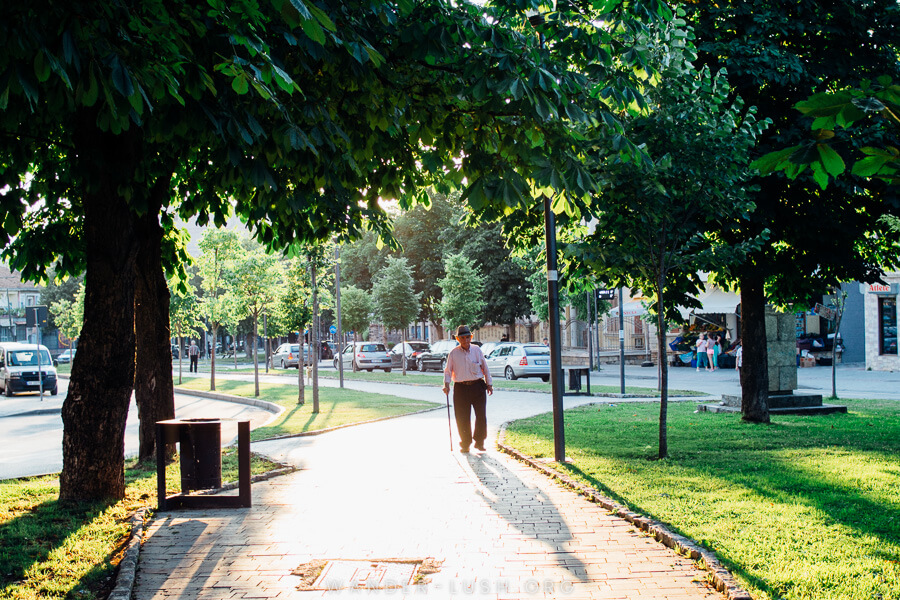
Albanian people are incredibly hospitable
Hospitality is serious business in Albania (yet another point of similarity to Georgia). In Albania, people are bound by Besa , a code of honour that dictates how others – especially strangers – should be treated. According to Besa, if someone approaches you for help, you accommodate them. If someone comes to you hungry, you feed them. This creed has shaped Albania into an immensely tolerant and welcoming nation.
After WWII, Albania was one of the few nations to emerge with a larger Jewish community – the nation protected its own and offered sanctuary to families fleeing from elsewhere in Europe. In the 1990s, Albania sheltered refugees from Kosovo displaced by conflict.
Today that same kind of generosity is extended to tourists. Kanun , the customary law of Albania, says that the master of a house should always have a spare bed ready for unexpected guests. While I wouldn’t recommend showing up on someone’s doorstep unannounced (Albania has Booking.com for a reason!), the takeaway is that Albanians will extend you a helping hand if and when you need it.
English is widely spoken, but not ubiquitous
Albanian is the official language in Albania but many people – especially those born after the fall of communism – speak a second language. As one person described it to me, Albanians are ‘thirsty to know the world’, and learning a foreign language is seen as a pathway to knowledge, experience and more opportunities.
English is the most popular second language and is taught in schools. At last count, around 40% of Albanians speak English. In my experience, anyone working in tourism or hospitality has at least a basic understanding of English. We got by in all the major cities and tourist destinations without any issues.
Albania is one of those countries where the language is so much more than a means of communication, it’s part of the culture and identity and a massive source of national pride. Learning a few words of Albanian will earn you big props.
Here are a few basic words:
- Hello – Përshëndetje (per-shen-det-ye)
- Bye – Mirupafshim (mi-ru-paf-shim)
- Yes – Po (po)
- No – Jo (yo)
- Thanks – Faleminderit (fal-e-min-der-it)
- Cheers – Gëzuar (ge-zu-ar)
There is a strong Italian and Greek influence
Albania is just across the pond from Italy and very close to Greece (especially Corfu). There were Italian colonists in Albania from 1926 onwards, and the country was actually invaded by Italy in 1939. Italy especially has a big influence in Albania – to such an extent that I noticed it right away.
You’ll see Italian cars, Italian coffee culture – and yes, pizza on almost every restaurant menu! Pizza is so popular in Albania, if you ever tire of local fare there’s always a Napoletana to fall back on.
Almost a third of Albanian people speak Italian and a quarter of the population speaks Greek. Many areas are officially bilingual Albanian-Italian, with road signs in both languages. If you know either of these languages, communication will come even easier to you.
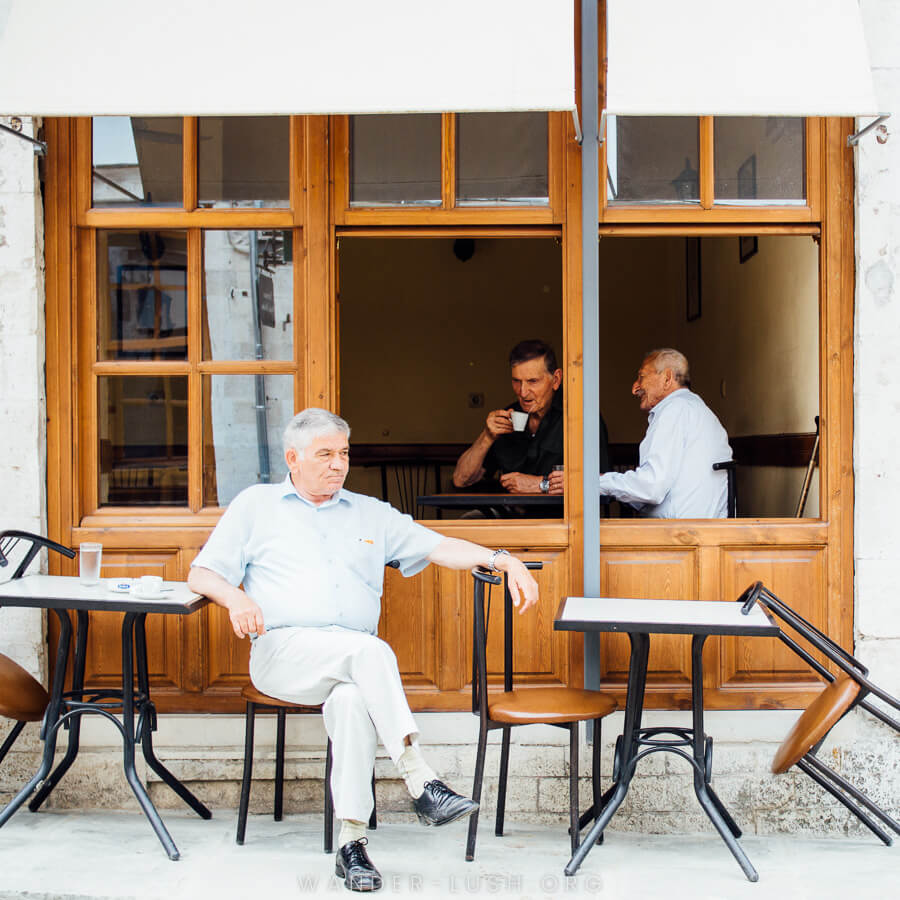
Tirana is one of the coolest cities in Europe – so don’t rush it!
Unlike a few other capital cities in the Balkans that are all cold concrete, Tirana is a warm, green, welcoming city that’s bristling with creative energy. I’ve said before that it’s probably the most liveable capital in the region in my opinion. There’s a park, dining precinct, cool museum or street art district around almost every corner.
One day in Tirana is enough for the must-sees, but I really recommend slowing down and spending a couple of nights here, getting into the rhythm of the city with morning markets and nightly xhiros.
We stayed in Tirana for a full week and still didn’t see everything.
Hiking in Albania is a must
I fell in love with Albania’s cities and towns, but even I agree that the country’s natural beauty is its biggest asset.
Albania has 15 national parks, each offering incredible scenery and hiking opportunities. As I recently discovered, Albania has more than 3,200 species of plants, accounting for a whopping 30% of the flora in Europe. One of the best places to appreciate this ecology is Llogara National Park, known for its wildflowers. Others, notably Butrint National Park, combine surreal landscapes with valuable archaeological sites.
Even if you’re an anti-hiker like me, there is one day trek in Albania you at least have to consider: Valbona to Theth . Walking between two alpine villages across two jaw-dropping national parks in the country’s far north, the trail takes you through the heart of the picturesque Albanian Alps or Accursed Mountains as they’re also known. The hike is tough going in spots, but it’s absolutely the best way to experience this side of Albania.
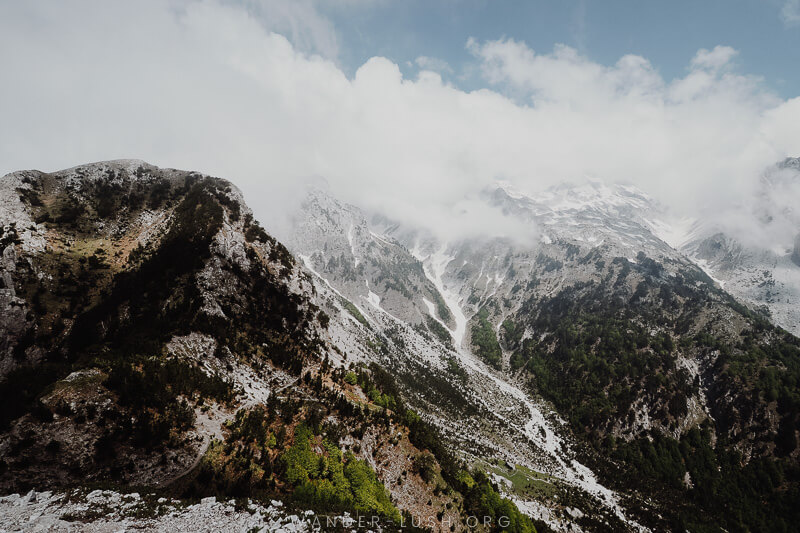
The lakes are just as impressive as the beaches
Albania might be famous for its beautiful beaches, but the unsung heroes of the landscape are the country’s lakes. Komani Lake, Lake Ohrid (shared with North Macedonia) and Skadar Lake in the north (shared with Montenegro ) are all beautiful and worth visiting.
Skadar is the largest lake in the Balkans. Boat trips on the marshy wetlands are popular on the Montenegrin side; on the Albanian side, you can cycle around the periphery from the lakeside city of Shkoder, visiting Rozafa Castle at the same time.
Albania’s share of Ohrid Lake is similarly smaller and with fewer points of interest to the North Macedonian side, yet charming villages such as Lin – a little red-roofed settlement on a natural peninsula – make it worth a visit. Lake Koman is my favourite. The ferry ride through the dramatic river gorge to reach Valbona and the starting point for the aforementioned hike was one of the highlights of my time in Albania.
There are more stunning water features around the country, including cascades and river canyons in the centre (Osumi and Begove near Berat are great), hot springs, and of course the famous Blue Eyes. All offer some much-needed reprieve in the hot summer months.
Have you been to Albania? Are there any extra travel tips for Albania you’d like to add? Leave your best advice in the comments below!
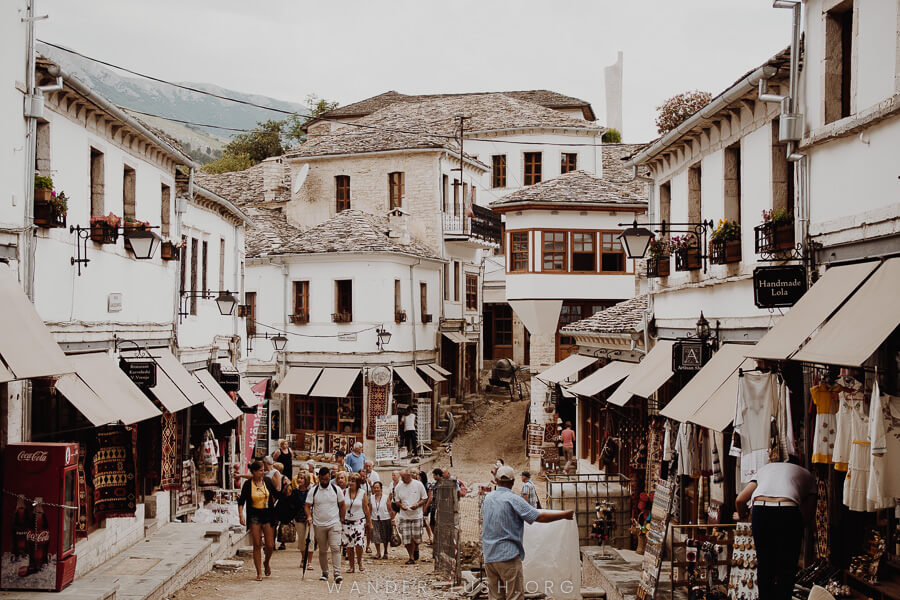
Albania Travel Guide
Discover insider tips, itinerary inspiration, and all the best things to see, do and experience in Albania!
Albania Essentials
My favourite resources and tools for planning a trip to Albania.
Find affordable flights to Albania
Book city tours & day trips
Hire a car in Albania
Get a visa for Albania
Find the perfect accommodation
Order the latest Lonely Planet
More from Albania
- 21 awesome things to do in Albania
- The perfect Albania itinerary
- 22 essential travel tips for Albania
- One day itinerary for Tirana
- Guide to the Valbona Theth hike
- Things to do in Gjirokaster
- Things to do in Berat
- Things to do in Korca
- Best beaches in Albania
- How to visit the Albania Blue Eyes
- 21 best things to do in Albania
- 22 useful travel tips for Albania
- Where to stay in Tirana
Leave a Reply Cancel reply
Your email address will not be published. Required fields are marked *
- Subscribe to future posts
Albania Travel Restrictions
Traveller's COVID-19 vaccination status
Travelling from the United Kingdom to Albania
Open for vaccinated visitors
COVID-19 testing
Not required
Not required for vaccinated visitors
Restaurants
Not required in enclosed environments and public transportation.
Ready to travel?
Find flights to albania, find stays in albania, explore more countries on travel restrictions map, destinations you can travel to now, netherlands, new zealand, philippines, switzerland, united arab emirates, united states, know when to go.
Sign up for email alerts as countries begin to open - choose the destinations you're interested in so you're in the know.
Can I travel to Albania from the United Kingdom?
Most visitors from the United Kingdom, regardless of vaccination status, can enter Albania.
Can I travel to Albania if I am vaccinated?
Fully vaccinated visitors from the United Kingdom can enter Albania without restrictions.
Can I travel to Albania without being vaccinated?
Unvaccinated visitors from the United Kingdom can enter Albania without restrictions.
Do I need a COVID test to enter Albania?
Visitors from the United Kingdom are not required to present a negative COVID-19 PCR test or antigen result upon entering Albania.
Can I travel to Albania without quarantine?
Travellers from the United Kingdom are not required to quarantine.
Do I need to wear a mask in Albania?
Mask usage in Albania is not required in enclosed environments and public transportation.
Are the restaurants and bars open in Albania?
Restaurants in Albania are open. Bars in Albania are .
- Guides And Tips
- Information
Albania Travel Restrictions COVID-19

- May 18, 2021
Table of Contents
COVID-19 Albania Travel Advice
- Albania has confirmed more than 130 859 cases of positive COVID-19 cases.
- Current airlines operating in Albania can be found here https://www.tirana-airport.com/c/63/airlines
- Starting from April 12, 2021 direct flight schedule with United Kingdom has resumed
- Preschools and kindergartens reopened.
- All cultural events and other large public gatherings in Albania are currently not possible.
- Professional sporting events have resumed, with no spectators allowed to attend.
- Malls and shops are open with strict social distancing guidelines in place.
- Hairdressers and dentists are opened with strict social distancing guidelines in place.
- Restaurants and cafes are open.
- All indoor activity centres are currently open.
- Beaches are open.
- Outdoor exercise is permitted
- Libraries and museums are open.
- Public transportation has resumed.
- All maritime and air borders have reopened
- The government is pushing with the massive vaccination so that we can prepare in time for the upcoming tourist season.
- The Albanian Government has approved 4 vaccines to be used in the general population.
- Currently there is a massive vaccination taking place in Albania and 4 vaccines administered such as: Pfizer-BioNTech, AstraZeneca-Oxford, Sputnik V and Sinovac.
- So far 800 000 vaccinations have been administered as of June 2021.
- 100 000 thousand Albanian citizens have received two doses.
- Albania has currently 730 000 vaccine doses available in the country.
- The bi-weekly incidence is halved for every 100 000 inhabitants.
- Hospitalizations are decreasing in frequency
- 419 246 vaccine doses have been administered to citizens above 60 years of age.
- Until know Albania has secured 1.6 million doses for 800 000 citizens through its agreement with the COVAX program, Pfizer, Astra Zeneca and Sinovac.
Covid-19 Testing in Albania
- PCR and/or antigen tests are available for all foreign citizens visiting Albania
- Covid negative test results are available within 24 hours
- American Hospital Laboratory (Tel: +355 4 222 5640)
- Biocheck Diagnostic (Tel: +355 4 242 7025)
- Genius Lab (Cell: +355 69 303 3026)
- German Hospital International (Cell: +355 67 200 4282)
- Intermedica (Tel: +355 4 220 0600)
- Noval Diagnostic (Cell: +355 68 804 2045)
- SALUS Lab (Cell: +355 68 205 3180)
- The average cost for testing is: (PCR = 8,500 ALL ) – (Antigen = 4,000 ALL ).
Albania Entry and Exit Requirements for COVID-19
- Foreign citizens are permitted to enter Albania. There is no restriction in place.
- Commercial flights have resumed since June 25, 2020. For more information, please check with Tirana Airport https://www.tirana-airport.com/c/63/airlines
- No PCR or Serology test is required upon entrance to Albania
- Albanian’s borders are opened for travel, but further restriction might be in place in the neighbouring countries.
The Albanian Government has issued the following protocol to all foreigners who will visit Albania in 2021.
For all citizens travelling through the albanian territory by land:.
- Since June 1, 2020 Albania has opened its borders so all travellers are free to visit the country.
- No quarantine rules apply except in special cases according to local health authority notifications
- No specific documents are required to enter the Albanian territory in all land border crossings.
- In all land border crossing temperature check is required and must not exceed 37.5 grade. In case of a higher temperature the passenger is not allowed to travel to Albania.
- All travellers have to be informed about Albania’s neighbouring countries entry regulation in case of transit.
- All travellers should consult with their respective Embassies in their home country in case of transiting Albania to one of Albanian’s neighbouring countries.
For all citizens travelling to Albania by sea:
They should consult the Albanian official representatives in the country from which they depart, or they can contact the Albanian Embassies in one of these countries.
For all citizens travelling by air:
For those citizens travelling from a third country by air and using as a transit one of the International Airports, they will not be allowed to exit the Airport Transit Area and they will not be allowed to travel to the next destination if that destination is a country within the Schengen zone. Because this way of travelling is not considered transit but entrance to Schengen area.
All those citizens who are allowed to enter the territory of the Republic of Albania need to respect the following rules:
- Everyone is required to wear masks when entering the terminal of Mother Theresa Airport.
- Children under the age of 6 and other persons with underlying medical conditions do not need to wear a mask so they are exempt of this rule.
- Masks need to be changed every 4 hours or when they are damaged since they lose their effectiveness.
- Travellers are expected to reduce the touching of the face and wash or disinfect their hands frequently.
- In case the passenger shows signs of covid-19 symptoms he/she will not be allowed to enter Albania.
- Mother Theresa Airport has designated areas where you can find masks and disinfectants.
- All passengers entering the Mother Theresa Airport have to pass through a disinfecting tunnel in the terminal.
- After checking in all passengers have to sign a declaration regarding their health condition in relation to COVID-19 before boarding the plane.
- All passengers either entering or exiting Mother Theresa Airport have to undergo a mandatory temperature check which should not exceed 37.5 degrees otherwise they will not be allowed to travel.
- During the stay in the Airport all passengers are expected to maintain physical distance of 1.5 meters from one another at all times.
While in Albania
- Bars, restaurants and night clubs are closed from 22.00 until 6.00 except delivery services.
- Gatherings of above 10 people are not allowed outdoors.
- Wearing masks is obligatory in public areas and institutions but not in bars and restaurants.
We are updating continually this list.
Travelling to Albania during COVID_19
Current infection numbers are low according to the Albanian Ministry of Health and the government is doing its best to insure everyone get vaccinated as soon as possible.
The Albanian government’s current target is to vaccinate 1 million (out of 3 millions) Albanians with the first dose by June – July 2021.
Travel is not restricted so foreigners wishing to travel to Albania are welcomed. The tourist summer season has started so the government is welcoming everyone who is thinking to spend their summer vacations to Albania.
Everyone who is currently working in Tourism in Albania has been offered COVID_19 Vaccine by the government in order to create a safer environment for the upcoming tourist season.
Can I travel to Albania from UK now?
From 17 May, the ‘Stay in the UK’ regulation will cease and international travel will be allowed to restart, governed by a new traffic light system.
As the virus is still spreading in many parts of the world, according to FCO advice people should not be travelling to amber or red countries which includes Albania .
Albania is included in the Amber list of countries and territories. Check the list here
Passengers who have visited or transited through an amber country will be required to fill in the passenger locator form, provide a valid notification of a negative test result prior to travel, quarantine at home for 10 days, and take a test on day 2 and day 8 after arrival.
Sondor Travel understands that the COVID19 pandemic has changed the travel industry. This means it will offer help to all the individuals and ensure safe touring with us.
We all know the healing power of nature and the outdoors –. And we all know that engaging in our favorite recreation activity – boating, hiking, climbing, motorcycling, camping, fishing, biking, or whatever – does wonders for our health and well-being. However, we have to be smart about getting outside in this public health emergency.
We offer outdoor tours which are great for the ones who want to travel during a pandemic.
Dear Sir , i am shah Nawaz Ali and i want to visit Albania for tourism.
in these days we are on tour of Istanbul. and from Istanbul we also want to visit Albania
we want to submit E visa for tourism for 1 week.
to apply for E visa we need complete tour arrangements like hotel , a tour operator , and return tickets for 1 week .
kindly guide us with proper information and tour arrangement prices.
i shall be thankful to you for your proper feedback
Shah Nawaz Ali
Leave a comment Cancel reply
Save my name, email, and website in this browser for the next time I comment.
Enter the e-mail address associated with the account. We'll e-mail a link to reset your password.
You are using an outdated browser. Upgrade your browser today or install Google Chrome Frame to better experience this site.
Albania Traveler View
Travel health notices, vaccines and medicines, non-vaccine-preventable diseases, stay healthy and safe.
- Packing List
After Your Trip
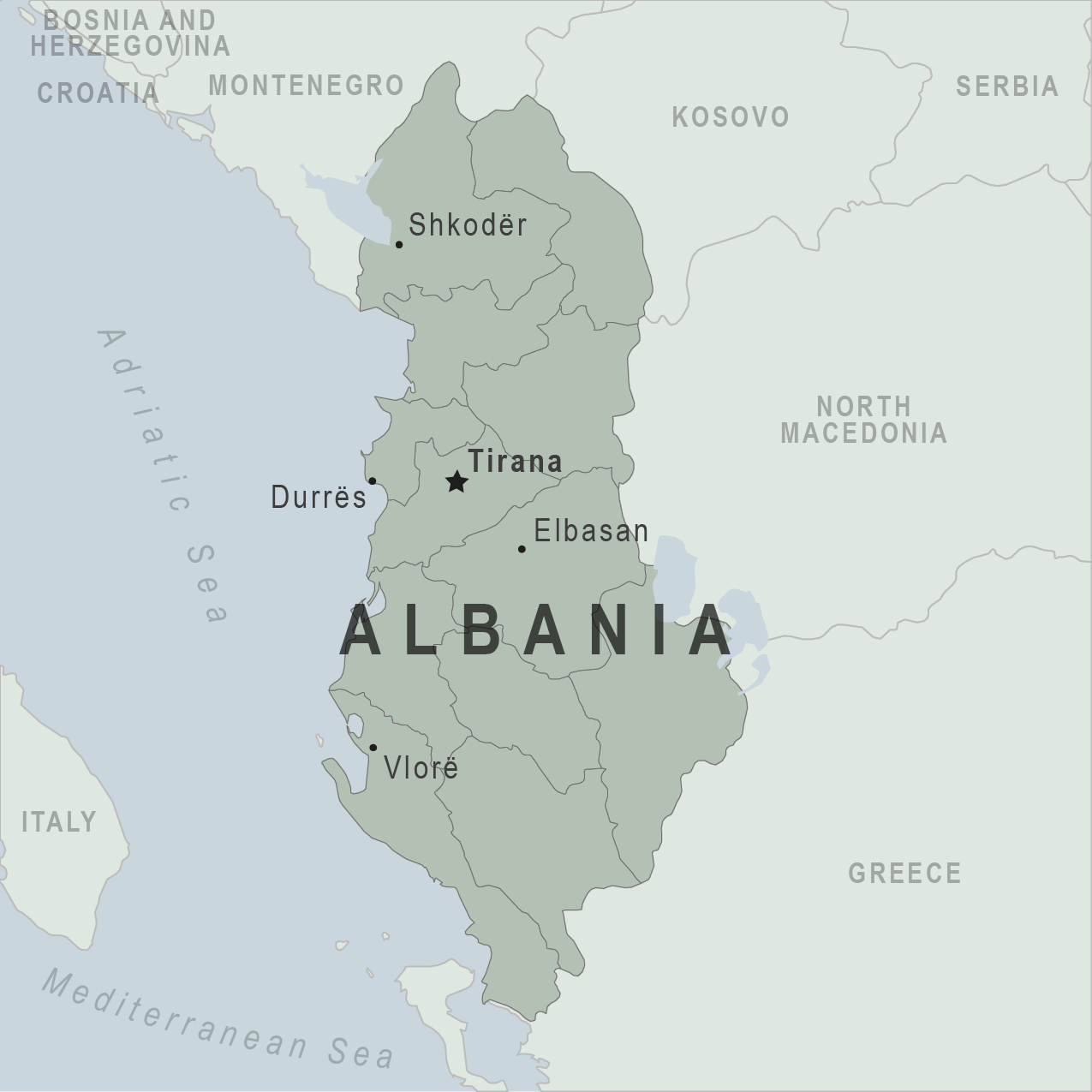
There are no notices currently in effect for Albania.
⇧ Top
Check the vaccines and medicines list and visit your doctor at least a month before your trip to get vaccines or medicines you may need. If you or your doctor need help finding a location that provides certain vaccines or medicines, visit the Find a Clinic page.
Routine vaccines
Recommendations.
Make sure you are up-to-date on all routine vaccines before every trip. Some of these vaccines include
- Chickenpox (Varicella)
- Diphtheria-Tetanus-Pertussis
- Flu (influenza)
- Measles-Mumps-Rubella (MMR)
Immunization schedules
All eligible travelers should be up to date with their COVID-19 vaccines. Please see Your COVID-19 Vaccination for more information.
COVID-19 vaccine
Hepatitis A
Recommended for unvaccinated travelers one year old or older going to Albania.
Infants 6 to 11 months old should also be vaccinated against Hepatitis A. The dose does not count toward the routine 2-dose series.
Travelers allergic to a vaccine component or who are younger than 6 months should receive a single dose of immune globulin, which provides effective protection for up to 2 months depending on dosage given.
Unvaccinated travelers who are over 40 years old, immunocompromised, or have chronic medical conditions planning to depart to a risk area in less than 2 weeks should get the initial dose of vaccine and at the same appointment receive immune globulin.
Hepatitis A - CDC Yellow Book
Dosing info - Hep A
Hepatitis B
Recommended for unvaccinated travelers of all ages traveling to Albania.
Hepatitis B - CDC Yellow Book
Dosing info - Hep B
Cases of measles are on the rise worldwide. Travelers are at risk of measles if they have not been fully vaccinated at least two weeks prior to departure, or have not had measles in the past, and travel internationally to areas where measles is spreading.
All international travelers should be fully vaccinated against measles with the measles-mumps-rubella (MMR) vaccine, including an early dose for infants 6–11 months, according to CDC’s measles vaccination recommendations for international travel .
Measles (Rubeola) - CDC Yellow Book
Albania is free of dog rabies. However, rabies may still be present in wildlife species, particularly bats. CDC recommends rabies vaccination before travel only for people working directly with wildlife. These people may include veterinarians, animal handlers, field biologists, or laboratory workers working with specimens from mammalian species.
Rabies - CDC Yellow Book
Yellow Fever
Required for travelers ≥1 year old arriving from countries with risk for YF virus transmission 1
Not recommended
Yellow Fever - CDC Yellow Book
Avoid contaminated water
Leptospirosis
How most people get sick (most common modes of transmission)
- Touching urine or other body fluids from an animal infected with leptospirosis
- Swimming or wading in urine-contaminated fresh water, or contact with urine-contaminated mud
- Drinking water or eating food contaminated with animal urine
- Avoid contaminated water and soil
Clinical Guidance
Avoid bug bites.
Crimean-Congo Hemorrhagic fever
- Tick bite
- Touching the body fluids of a person or animal infected with CCHF
- Avoid Bug Bites
Leishmaniasis
- Sand fly bite
Airborne & droplet
- Breathing in air or accidentally eating food contaminated with the urine, droppings, or saliva of infected rodents
- Bite from an infected rodent
- Less commonly, being around someone sick with hantavirus (only occurs with Andes virus)
- Avoid rodents and areas where they live
- Avoid sick people
Tuberculosis (TB)
- Breathe in TB bacteria that is in the air from an infected and contagious person coughing, speaking, or singing.
Learn actions you can take to stay healthy and safe on your trip. Vaccines cannot protect you from many diseases in Albania, so your behaviors are important.
Eat and drink safely
Food and water standards around the world vary based on the destination. Standards may also differ within a country and risk may change depending on activity type (e.g., hiking versus business trip). You can learn more about safe food and drink choices when traveling by accessing the resources below.
- Choose Safe Food and Drinks When Traveling
- Water Treatment Options When Hiking, Camping or Traveling
- Global Water, Sanitation and Hygiene | Healthy Water
- Avoid Contaminated Water During Travel
You can also visit the Department of State Country Information Pages for additional information about food and water safety.
Prevent bug bites
Bugs (like mosquitoes, ticks, and fleas) can spread a number of diseases in Albania. Many of these diseases cannot be prevented with a vaccine or medicine. You can reduce your risk by taking steps to prevent bug bites.
What can I do to prevent bug bites?
- Cover exposed skin by wearing long-sleeved shirts, long pants, and hats.
- Use an appropriate insect repellent (see below).
- Use permethrin-treated clothing and gear (such as boots, pants, socks, and tents). Do not use permethrin directly on skin.
- Stay and sleep in air-conditioned or screened rooms.
- Use a bed net if the area where you are sleeping is exposed to the outdoors.
What type of insect repellent should I use?
- FOR PROTECTION AGAINST TICKS AND MOSQUITOES: Use a repellent that contains 20% or more DEET for protection that lasts up to several hours.
- Picaridin (also known as KBR 3023, Bayrepel, and icaridin)
- Oil of lemon eucalyptus (OLE) or para-menthane-diol (PMD)
- 2-undecanone
- Always use insect repellent as directed.
What should I do if I am bitten by bugs?
- Avoid scratching bug bites, and apply hydrocortisone cream or calamine lotion to reduce the itching.
- Check your entire body for ticks after outdoor activity. Be sure to remove ticks properly.
What can I do to avoid bed bugs?
Although bed bugs do not carry disease, they are an annoyance. See our information page about avoiding bug bites for some easy tips to avoid them. For more information on bed bugs, see Bed Bugs .
For more detailed information on avoiding bug bites, see Avoid Bug Bites .
Stay safe outdoors
If your travel plans in Albania include outdoor activities, take these steps to stay safe and healthy during your trip.
- Stay alert to changing weather conditions and adjust your plans if conditions become unsafe.
- Prepare for activities by wearing the right clothes and packing protective items, such as bug spray, sunscreen, and a basic first aid kit.
- Consider learning basic first aid and CPR before travel. Bring a travel health kit with items appropriate for your activities.
- If you are outside for many hours in heat, eat salty snacks and drink water to stay hydrated and replace salt lost through sweating.
- Protect yourself from UV radiation : use sunscreen with an SPF of at least 15, wear protective clothing, and seek shade during the hottest time of day (10 a.m.–4 p.m.).
- Be especially careful during summer months and at high elevation. Because sunlight reflects off snow, sand, and water, sun exposure may be increased during activities like skiing, swimming, and sailing.
- Very cold temperatures can be dangerous. Dress in layers and cover heads, hands, and feet properly if you are visiting a cold location.
Stay safe around water
- Swim only in designated swimming areas. Obey lifeguards and warning flags on beaches.
- Practice safe boating—follow all boating safety laws, do not drink alcohol if driving a boat, and always wear a life jacket.
- Do not dive into shallow water.
- Do not swim in freshwater in developing areas or where sanitation is poor.
- Avoid swallowing water when swimming. Untreated water can carry germs that make you sick.
- To prevent infections, wear shoes on beaches where there may be animal waste.
Keep away from animals
Most animals avoid people, but they may attack if they feel threatened, are protecting their young or territory, or if they are injured or ill. Animal bites and scratches can lead to serious diseases such as rabies.
Follow these tips to protect yourself:
- Do not touch or feed any animals you do not know.
- Do not allow animals to lick open wounds, and do not get animal saliva in your eyes or mouth.
- Avoid rodents and their urine and feces.
- Traveling pets should be supervised closely and not allowed to come in contact with local animals.
- If you wake in a room with a bat, seek medical care immediately. Bat bites may be hard to see.
All animals can pose a threat, but be extra careful around dogs, bats, monkeys, sea animals such as jellyfish, and snakes. If you are bitten or scratched by an animal, immediately:
- Wash the wound with soap and clean water.
- Go to a doctor right away.
- Tell your doctor about your injury when you get back to the United States.
Consider buying medical evacuation insurance. Rabies is a deadly disease that must be treated quickly, and treatment may not be available in some countries.
Reduce your exposure to germs
Follow these tips to avoid getting sick or spreading illness to others while traveling:
- Wash your hands often, especially before eating.
- If soap and water aren’t available, clean hands with hand sanitizer (containing at least 60% alcohol).
- Don’t touch your eyes, nose, or mouth. If you need to touch your face, make sure your hands are clean.
- Cover your mouth and nose with a tissue or your sleeve (not your hands) when coughing or sneezing.
- Try to avoid contact with people who are sick.
- If you are sick, stay home or in your hotel room, unless you need medical care.
Avoid sharing body fluids
Diseases can be spread through body fluids, such as saliva, blood, vomit, and semen.
Protect yourself:
- Use latex condoms correctly.
- Do not inject drugs.
- Limit alcohol consumption. People take more risks when intoxicated.
- Do not share needles or any devices that can break the skin. That includes needles for tattoos, piercings, and acupuncture.
- If you receive medical or dental care, make sure the equipment is disinfected or sanitized.
Know how to get medical care while traveling
Plan for how you will get health care during your trip, should the need arise:
- Carry a list of local doctors and hospitals at your destination.
- Review your health insurance plan to determine what medical services it would cover during your trip. Consider purchasing travel health and medical evacuation insurance.
- Carry a card that identifies, in the local language, your blood type, chronic conditions or serious allergies, and the generic names of any medications you take.
- Some prescription drugs may be illegal in other countries. Call Albania’s embassy to verify that all of your prescription(s) are legal to bring with you.
- Bring all the medicines (including over-the-counter medicines) you think you might need during your trip, including extra in case of travel delays. Ask your doctor to help you get prescriptions filled early if you need to.
Many foreign hospitals and clinics are accredited by the Joint Commission International. A list of accredited facilities is available at their website ( www.jointcommissioninternational.org ).
In some countries, medicine (prescription and over-the-counter) may be substandard or counterfeit. Bring the medicines you will need from the United States to avoid having to buy them at your destination.
Select safe transportation
Motor vehicle crashes are the #1 killer of healthy US citizens in foreign countries.
In many places cars, buses, large trucks, rickshaws, bikes, people on foot, and even animals share the same lanes of traffic, increasing the risk for crashes.
Be smart when you are traveling on foot.
- Use sidewalks and marked crosswalks.
- Pay attention to the traffic around you, especially in crowded areas.
- Remember, people on foot do not always have the right of way in other countries.
Riding/Driving
Choose a safe vehicle.
- Choose official taxis or public transportation, such as trains and buses.
- Ride only in cars that have seatbelts.
- Avoid overcrowded, overloaded, top-heavy buses and minivans.
- Avoid riding on motorcycles or motorbikes, especially motorbike taxis. (Many crashes are caused by inexperienced motorbike drivers.)
- Choose newer vehicles—they may have more safety features, such as airbags, and be more reliable.
- Choose larger vehicles, which may provide more protection in crashes.
Think about the driver.
- Do not drive after drinking alcohol or ride with someone who has been drinking.
- Consider hiring a licensed, trained driver familiar with the area.
- Arrange payment before departing.
Follow basic safety tips.
- Wear a seatbelt at all times.
- Sit in the back seat of cars and taxis.
- When on motorbikes or bicycles, always wear a helmet. (Bring a helmet from home, if needed.)
- Avoid driving at night; street lighting in certain parts of Albania may be poor.
- Do not use a cell phone or text while driving (illegal in many countries).
- Travel during daylight hours only, especially in rural areas.
- If you choose to drive a vehicle in Albania, learn the local traffic laws and have the proper paperwork.
- Get any driving permits and insurance you may need. Get an International Driving Permit (IDP). Carry the IDP and a US-issued driver's license at all times.
- Check with your auto insurance policy's international coverage, and get more coverage if needed. Make sure you have liability insurance.
- Avoid using local, unscheduled aircraft.
- If possible, fly on larger planes (more than 30 seats); larger airplanes are more likely to have regular safety inspections.
- Try to schedule flights during daylight hours and in good weather.
Medical Evacuation Insurance
If you are seriously injured, emergency care may not be available or may not meet US standards. Trauma care centers are uncommon outside urban areas. Having medical evacuation insurance can be helpful for these reasons.
Helpful Resources
Road Safety Overseas (Information from the US Department of State): Includes tips on driving in other countries, International Driving Permits, auto insurance, and other resources.
The Association for International Road Travel has country-specific Road Travel Reports available for most countries for a minimal fee.

Maintain personal security
Use the same common sense traveling overseas that you would at home, and always stay alert and aware of your surroundings.
Before you leave
- Research your destination(s), including local laws, customs, and culture.
- Monitor travel advisories and alerts and read travel tips from the US Department of State.
- Enroll in the Smart Traveler Enrollment Program (STEP) .
- Leave a copy of your itinerary, contact information, credit cards, and passport with someone at home.
- Pack as light as possible, and leave at home any item you could not replace.
While at your destination(s)
- Carry contact information for the nearest US embassy or consulate .
- Carry a photocopy of your passport and entry stamp; leave the actual passport securely in your hotel.
- Follow all local laws and social customs.
- Do not wear expensive clothing or jewelry.
- Always keep hotel doors locked, and store valuables in secure areas.
- If possible, choose hotel rooms between the 2nd and 6th floors.
Healthy Travel Packing List
Use the Healthy Travel Packing List for Albania for a list of health-related items to consider packing for your trip. Talk to your doctor about which items are most important for you.
Why does CDC recommend packing these health-related items?
It’s best to be prepared to prevent and treat common illnesses and injuries. Some supplies and medicines may be difficult to find at your destination, may have different names, or may have different ingredients than what you normally use.
If you are not feeling well after your trip, you may need to see a doctor. If you need help finding a travel medicine specialist, see Find a Clinic . Be sure to tell your doctor about your travel, including where you went and what you did on your trip. Also tell your doctor if you were bitten or scratched by an animal while traveling.
For more information on what to do if you are sick after your trip, see Getting Sick after Travel .
Map Disclaimer - The boundaries and names shown and the designations used on maps do not imply the expression of any opinion whatsoever on the part of the Centers for Disease Control and Prevention concerning the legal status of any country, territory, city or area or of its authorities, or concerning the delimitation of its frontiers or boundaries. Approximate border lines for which there may not yet be full agreement are generally marked.
Other Destinations
If you need help finding travel information:
Message & data rates may apply. CDC Privacy Policy
File Formats Help:
- Adobe PDF file
- Microsoft PowerPoint file
- Microsoft Word file
- Microsoft Excel file
- Audio/Video file
- Apple Quicktime file
- RealPlayer file
- Zip Archive file
Exit Notification / Disclaimer Policy
- The Centers for Disease Control and Prevention (CDC) cannot attest to the accuracy of a non-federal website.
- Linking to a non-federal website does not constitute an endorsement by CDC or any of its employees of the sponsors or the information and products presented on the website.
- You will be subject to the destination website's privacy policy when you follow the link.
- CDC is not responsible for Section 508 compliance (accessibility) on other federal or private website.
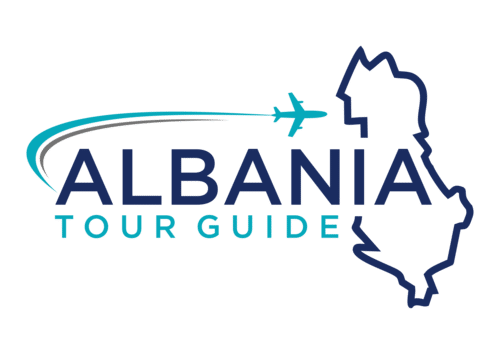
What do I need to know before going to Albania?
I received so many questions from travellers, that I decided to write a blogpost about what you need to know before going to Albania.
1. Corona Virus entry requirements, travel restrictions & Covid testing in Albania
After last year, the most frequent asked questions I get about travelling in Albania are:
- What are the entry requirements for Albania?
- Are there any travel restrictions for travellers from … to Albania?
- Do I need a PCR test to enter Albania?
- Where can a take a COVID test in Albania?
So, to answer all of your Corona Virus and COVID testing questions, I have created a blogpost.
In the blogpost, you will find an overview of the entry requirements and travel restrictions in place in Albania. Moreover, I have an up-to-date list of the PCR locations and a list of the other COVID tests available in Albania.
I won’t go into detail in this blogpost, because as you know the regulations change very frequently. So you can find the lastest COVID information in this blogpost, which I update every week: https://albaniatourguide.com/albania-covid-travel-restrictions-pcr-testing-and-coronavirus/
2. Driving in Albania as a foreigner is daunting
Driving in Albania as a foreigner can be daunting. Because the Albanian drivers don’t exactly follow the rules.
Basically, the Albanian people have a very chaotic driving style. To give you an example, on a roundabout, you can see Albanian people getting on the roundabout from all directions.
You might struggle if you are used to driving in USA or in Europe, because there are rules as to when and how you are allowed to get on the roundabout. But in Albania, if you let other people go first, according to the rules, you will never get to your destination.
Unfortunately, some Albanian drivers really do not follow the rules. So drivers may takeover on all sides.
Since I live in Albania and I know the driving style here, I would not recommend driving in Albania as a foreigner. If you do, at the very least you would need to be an experienced driver, confident and alert. But you may still find that Albanian drivers drive in unexpected ways.
Although, the Albanian authorities and the police have been strict with people who break the rules in the recent years. It remains difficult to change the Albanian driving culture.
So think twice if you plan on renting a car for your holiday in Albania.
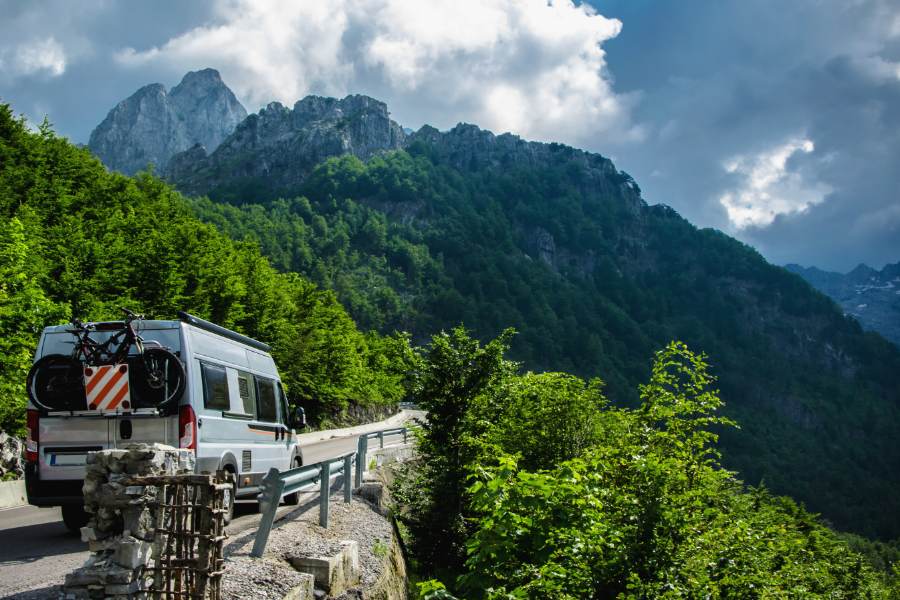
3. Think about your transportation before travelling to Albania
As a foreign traveller in Albania, your main challenge will be “how do I get from one place to another in Albania?”.
For the Albanian people, the preferred way to travel is the Furgon, which is Albanian for a mini-bus.
The Albanian bussystem is quite different from other countries. Because the minibusses are privately owned. Which means that the busdriver owns the bus and the profit of the day ends up in his pocket.
In another European country, the bus driver will wear a uniform and follow the brand-standards. But in Albania, the bus driver does whatever works for him.
If you would like to travel to another city in Albania, you must go to the intercity bus station. In the capital city Tirana, the busses depart from the Regional Bus Terminal – North and South (in Albanian: Terminali i Autobusave të Veriut dhe Jugut). You can see the location on Google Maps here: https://goo.gl/maps/HCKaoxYdYDEaxPQE8
So for instance, if you would like to travel from Tirana to Berat, you must take a taxi for 20 minutes from the city center of Tirana to the Regional Bus Terminal.
When you arrive at the Regional Bus Terminal, the bus drivers will immediately approach you shouting their destination loudly. Obviously, every bus driver wants a full bus, because more travellers means more money for him.
I sometimes get questions like “Do I reserve a bus ticket online” or “Can I pay my bus ticket by credit card in Albania?”. And the answer to that is: “NO”. You simply show up at the bus station and pay the driver in cash (Albanian Leke).
If you decide to travel by bus, I recommend you use the website of Gjirafa Autobus. Gjirafa Autobus is a website, where you can find all the Albanian bus timetables. This is the link of the website: https://gjirafa.com/Autobus
Bear in mind, that travelling in Albania by bus will be timeconsuming for you. Because as a foreigner, finding the bus terminal will take you more time than the locals, who know their way around. And Google Maps is not as accurate in Albania, as it is in other countries.
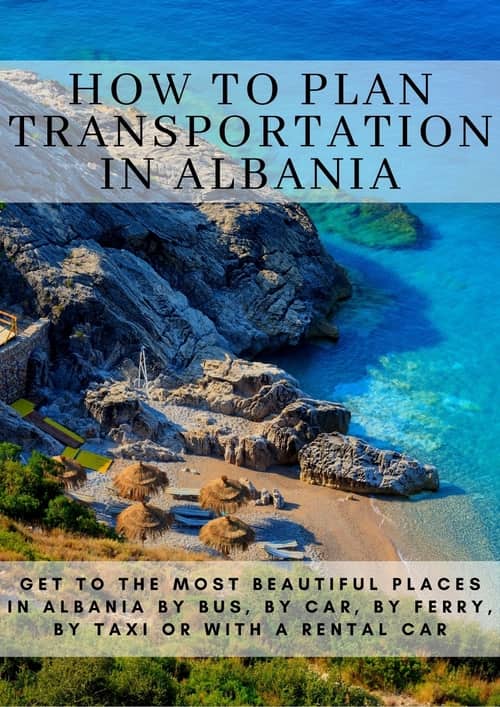
The Transportation Guide every Traveller in Albania Needs in 2021!
Whether you travel by bus, by car, by ferry, by taxi or with a rental car - this transportation guide will get you to the most beautiful places in albania., and it's yours free, you have successfully subscribed.
Privacy Policy Albania Tour Guide
4. I don’t recommend train travel in Albania
First of all, it is not possible to travel from another country to Albania by train. Because Albania does not have international rail connections.
The reason why Albania does not have international rail connections. Is because the rail network in Albania was constructed during the communist regime.
During the communist regime (which ended in 1992), Albania was ruled by a dictator, called Enver Hoxha. And essentially, the dictator isolated Albania from the rest of the world. Similar to North Korea today.
During the communism, it was not possible for Albanians to leave Albania and travel abroad. As a result, there was simply no need for an international rail connection. Since the fall of the communism, there has not been any investment in the rail network.
As a result of the lack of investment, the trains became slower and slower. And fewer and fewer people travelled by train. And as a result of that, trains depart very infrequent.
Now that you have read this, you do understand why the Albanian people do not travel by train. Albanian people prefer to travel by car or with a Furgon minibus. Because minibusses are faster than trains in Albania and a lot more frequent.
I do not recommend you travel by train in Albania as a foreigner. The only reason to travel by train would be because you want to go on an adventure and travel with the old train as an experience.
Ask any Albanian person when you are here on holiday and they will tell you the same.
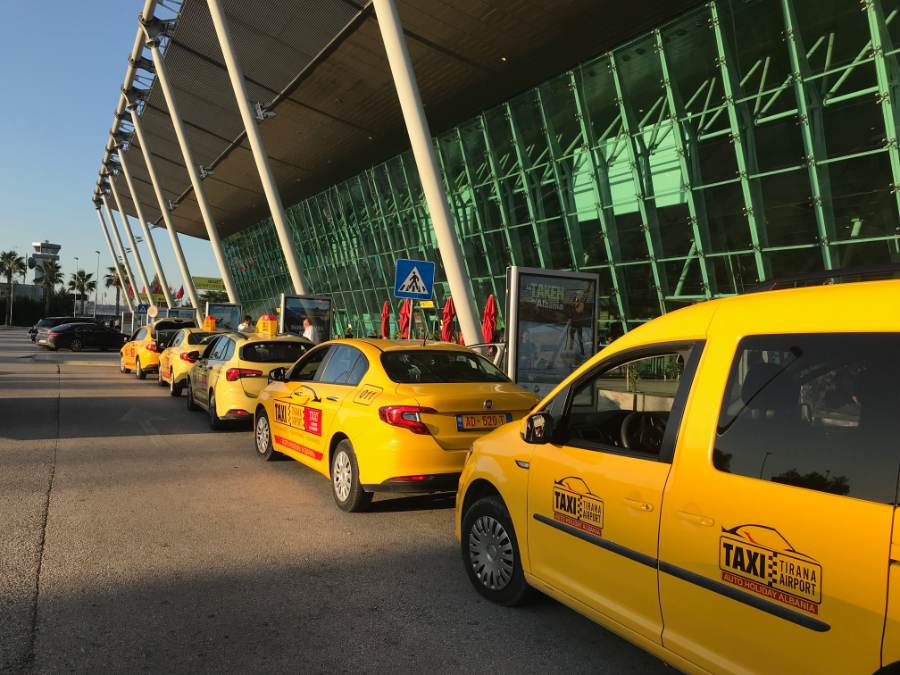
5. Compare the price of your taxi with the price of a tour
If you decide you don’t want to rent a car or travel by bus, your may choose to take several taxis in Albania.
Attention! Make sure you compare the price of a taxi journey with the price of a private tour. Because very often a tour is less expensive!
Let’s say, you want to go on a day trip from Tirana to Shkoder. The official Tirana Airport taxi website states that a one-way trip from Tirana to Shkoder costs between 55 – 62 euros ( https://tiataxi.al/travel/ ). Whereas you could book a private tour from Tirana to Shkoder for 70 euros.
This private tour would include two-way transportation, private tour guide, entrance tickets and pick-up/drop-off at your hotel. So why not book the private tour?
To give you another example, if you want to go on a day trip from Tirana to Berat. Merr Taxi will charge you 68 euros for a one-way trip ( https://merrtaxi.com/tirana-taxi-fare-calculator )
Whereas, you can buy a private tour to Berat for 65 euros. And the private tour includes two-way transportation, private tour guide, entrance tickets and pick-up/drop-off at your hotel. So basically, the private tour is half the price!
Another question, I get a lot is: Is there UBER in Albania? And the answer is NO, UBER does not exist in Albania.
As an alternative, there are some taxi apps that you can download. The three main taxi apps in Albania are:
UPs Taxi – Click here for Play Store Download: https://play.google.com/store/apps/details?id=com.upstaxi.taxi.rider
Click here for Apple Store Download: https://apps.apple.com/us/app/ups-taxi/id1119391072
Speed Taxi – Click here for Play Store Download: https://play.google.com/store/apps/details?id=al.speedtaxi.app&hl=en
Click here for Apple Store Download: https://apps.apple.com/al/app/speed-taxi-albania/id1054113261
Taxi.al – Click here for Play Store Download: https://play.google.com/store/apps/details?id=com.netinformatika.merrtaxi
Click here for Apple Store Download: https://apps.apple.com/us/app/taxi-al/id1474960140
Obviously, travelling by taxi is super convenient as a foreigner. But always make sure you compare the price of your taxi with a private tour! If you don’t want to be guided, simply ask for some free time upon arrival and get your entrance tickets free as a part of your tour!
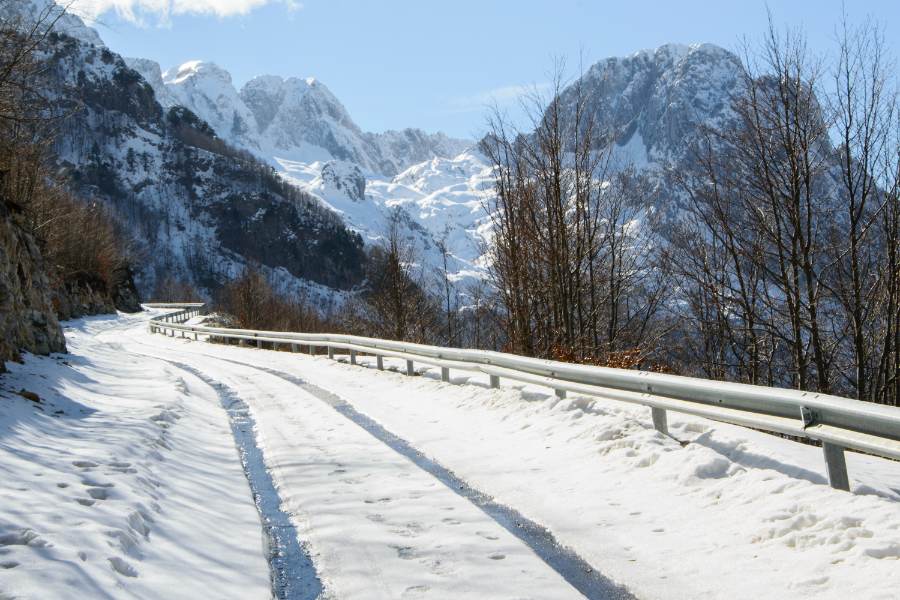
6. Some areas in Albania are very remote
Many foreigners travelling to Albania do not realize how remote some places in Albania are.
In the North of Albania, you have the Albanian Alps. This is a beautiful national park with mountains. This area is a popular destination for hikers and active travellers in the summer months.
However, the Albanian Alps are still incredibly remote! Throughout the winter and spring, the Albanian Alps are literally snowed in. The mountain roads are completely covered in thick snow.
Which means no human or car can make it to the area. The people living in the Albanian Alps are literally closed off from the rest of the world, until the snow melts.
The most popular destinations in the Albanian Alps are the Theth village, the Valbone village, the Lake Koman ferry and the Valbone Pass.
So if you plan on travelling to the Albanian Alps, Theth, Valbone or Lake Koman, here are some good questions to ask before you travel:
Questions 1: Is the road to Theth or Valbone free of snow in the period I am travelling?
This year, the road to Theth opened only on the 28th of May. And the date that the road re-opens varies every year, because it depends on the amount of snow that falls in the winter months. This is good to consider especially if you are travelling in the beginning of the season.
Question 2: Is the Valbone Pass free of snow in the period I am travelling?
The Valbone Pass is 1800 meters high and one of the most popular hiking routes in the Albanian Alps. This year the Valbone Pass opened on the 18th of June. Some experienced snow hikers managed to get accross the pass earlier than June, but you do need a special skillset to hike through the snow.
Question 3: Am I fit enough to undertake this journey, bearing in mind that the nearest hospital is hours away?
I am sure everyone can enjoy the beauty of the Albanian Alps, but it is worth asking yourself if you are fit enough to travel to a remote region. Theth for instance is 3 hours by car from Shkoder city, where you will find the nearest hospital. And if you are hiking somewhere in the mountains, it will take you even longer to get to a hospital.
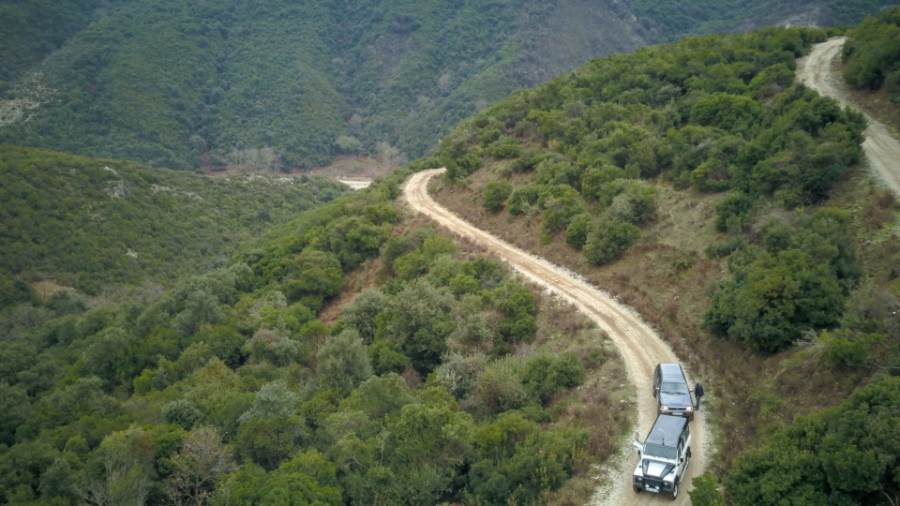
7. Book a 4-Wheel drive to travel to the Albanian Alps
I always recommend booking a local driver with a four wheel drive, if you are travelling to the Albanian Alps, including Theth, Valbone or Lake Koman.
A question I get asked a lot is: “How are the roads in Albania?”. The reason I get this question, is because there are some forums on Tripadvisor about this topic. As you can imagine, the opinions about the roads in Albania vary strongly. Which can be very confusing for a foreign traveller.
To give you one answer: The roads in the Albanian Alps are often stony dirt tracks that lead through the mountains. Whereas the roads in the South of Albania, to Durres, Berat, Gjirokaster and the Albanian Riviera are of a good quality.
Which means that you can drive in the South of Albania with a regular car. But if you travel to the Albanian Alps, I recommend hiring a local driver with a four wheel drive.
Theth, for instance, is a 3 hour drive from Shkoder city. But the last hour of the journey is on a stoney dirt track. Trust me, when you drive on a stony dirt track on the top of cliff and you meet a car from the other direction, you will be very happy you hired a local driver in a four wheel drive, who knows how to manouvre in the Albanian Alps.
Get Your Free Albania Tourist Map!
Enter your First Name and Email Address to get the Free Albania Tourist Map with the 78 Best Places to Visit in Albania!
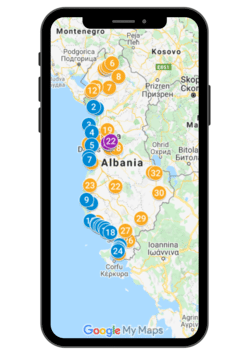
Your Free Albania Tourist Map is in your email! Thank you!
8. it takes time to travel to the albanian alps.
I recently spoke to a traveller, who had limited time, but really wanted to visit the best of the Albanian Alps. Which is completely understandable, however, it does take time to travel to the Albanian Alps.
Actually, if you want to travel to the Albanian Alps, you need at least 3 or 4 days.
Day 1: Lake Koman ferry to Valbone (full day)
Day 2: Hike across the Valbone Pass from Valbone to Theth (full day)
Day 3: Hike to the Blue Eye of Theth and the Grunas Waterfall. You can skip this day, if you only have 3 days, but these are beautiful highlights!
Day 4: Drive back from Theth to Shkoder, if you hire private transportation you can be back around noon. If you depend on shared transportation, you need to wait until noon before the shared transport departs.
Basically, it is impossible to “safe time” or “travel faster” to the Albanian Alps. Let me explain in a bit more detail.
If you want to travel with the Lake Koman ferry, it will always take you a full day. The Lake Koman ferry only departs once a day at 9AM in the morning. So you must depart from Tirana at 5AM or from Shkoder at 7AM to catch the ferry in Koman. The ferry travels from Koman to Fierze in 3 hours.
Then from Fierze, you have two options:
Option 1: Travel onwards from Fierze to Valbone and stay at least 1 night in Valbone.
Option 2: Travel back with the Lake Koman ferry from Fierze to Koman. So another 3 hours with the boat, which means you will be back in Shkoder around 5PM or Tirana around 7PM.
The only way you can travel to Valbone is by the Lake Koman Ferry. There is no road to Valbone that does not require you to take the Lake Koman Ferry, unless you will travel through Kosovo. And either way, it will take you a full day of travelling, so you will need to stay in Valbone for 1 night at least.
Then from Valbone, you can hike across the Valbone Pass, which will take you 6-8 hours. After the hiking trip, you must stay overnight in the Theth village at least 1 night, because it will be too dark to travel back to Shkoder.
The Theth village has beautiful natural sights, like the Blue Eye of Theth and the Grunas Waterfall. But it takes time to reach these natural sights. If you hike from the Theth village to the Blue Eye of Theth, it will take you 4 hours for the one way trip.
You can save time by booking a taxi, but it still requires to you to hike 1 hour to the Blue Eye of Theth and 1 hour back.
The Grunas Waterfall is around 50 minutes by foot from the Theth village for a one way trip. So it requires 2.5 hours in total, because you need some time to see the Waterfall and relax.
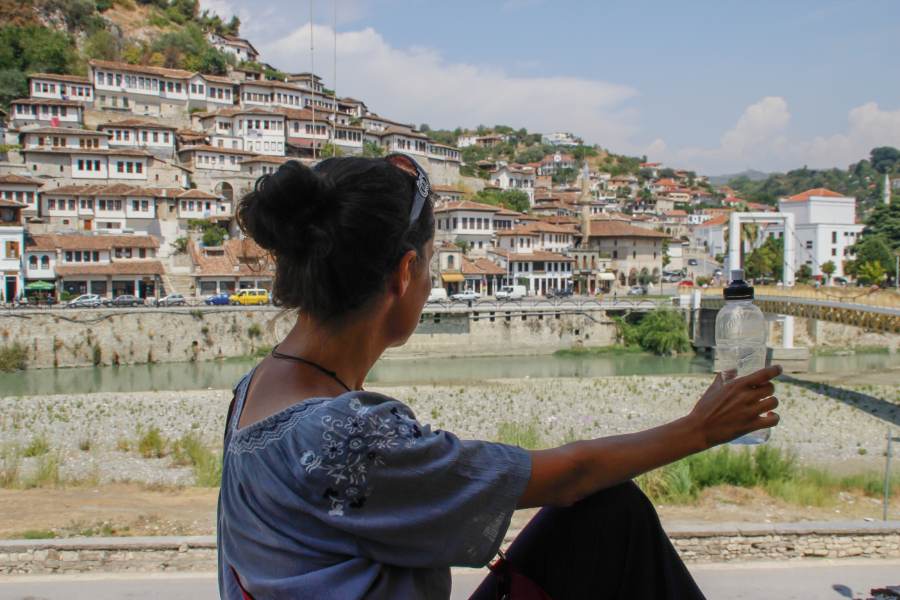
9. Always drink bottled water in Albania
In most places in Albania, the tap water is not drinking water. So it is better to always buy bottled water in Albania.
The locals in Albania always buy bottled mineral water. They use the tap water for washing the dishes or brushing their teeth, but when they drink a glass of water they choose mineral water.
Albania does have a lot of mountains and fresh water springs with mineral water. So in some areas in Albania, the locals do drink the mountain water and fill their bottles at a fresh water spring. Because the local people know that the mountain water tastes great and it is very clean. So if you want to drink water from a spring, check with the locals first.
Lonely Planet: “Drinking water is generally safe, and is delicious in the mountains, but check with locals first. Many locals in bigger cities prefer to drink bottled water.”
Moreover, if you look at the travel advice from the UK government and the Swiss government, they advise drinking bottled water in Albania. The UK government goes as far as saying that the tap water may cause illness. And the Swiss government states that the water supply system in Albania is old and incomplete.
UK Government: “The tap water in Albania may cause illness – you should drink only bottled water.”
Swiss Government: “The water supply system in Albania is old and incomplete. That’s why caution is needed with consuming tap water.”
The World Bank also points out that the drinking water and sewerage infrastructure is aged, damaged and inefficient. And they point out that there is a health risk for the population due to the drinking water system.
World Bank: “The drinking water and sewerage infrastructure in Albania is considerably aged, damaged, and inefficient. Leakage in supply systems and sewers is substantial and health risk for the population is significant.”
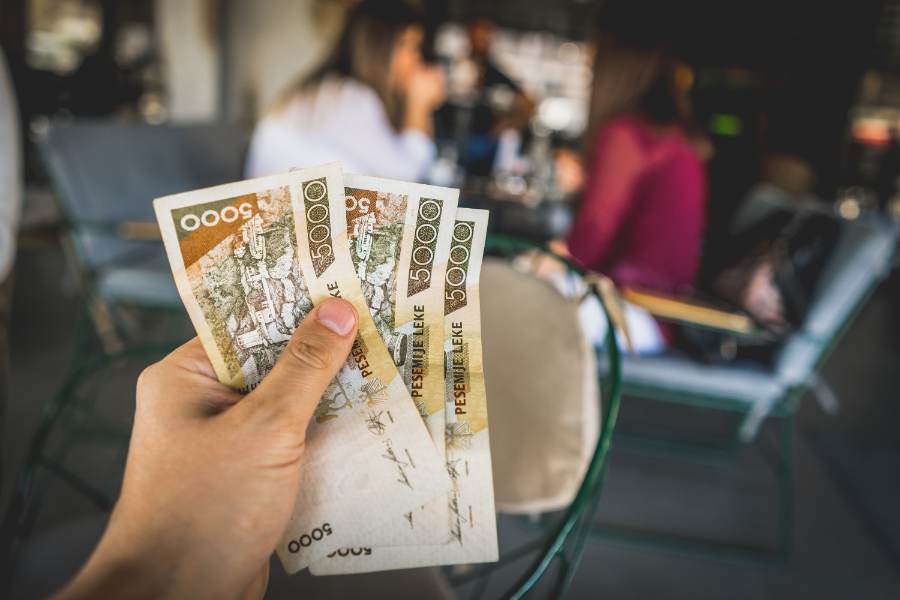
10. Always carry some cash money in Albania
Albania is a cash country. Simply said, the Albanian people ALWAYS prefer to pay in cash. You very rarely see an Albanian person pay with a credit card or a debit card.
Therefore, I do advice all foreign travellers in Albania to carry some cash money. Here are some examples of things you can only pay in cash in Albania:
- Bottled water at a street stand
- Bus tickets
- Fresh fruit at the market
- Souvenirs or handicraft items at the market
- Entrance tickets for castles and museums (very often only cash)
- Taxi rides (very often cash only or preferred)
You will probably be able to pay your hotel in Albania by credit card or debit card. It is also a good idea to bring some foreign currency with you to Albania. Currencies like Euro, US Dollars or Pounds can be exchanged everywhere.
The Albanian people very often have foreign currency on them and a foreign currency account at the bank. So, you will see currency exchange offices in almost every highstreet in the city centers.
Be careful with using your debit card or credit card for every little restaurant or cafe. Because paying by card in Albania can be expensive for you as a foreigner.
Especially, because Albania is not a part of the European Union, so the Albanian cash machines and POS systems do not have to follow the European Union’s rules about transparancy. So I always recommend withdrawing cash from a cash machine and checking your internet banking afterwards to check for any “hidden fees”.
You won’t break the bank by withdrawing cash in Albania, but nobody likes to find extra charges or hidden fees on their bank account after their holiday.
The main point is, you always need to have some cash on you in Albania. The locals will appreciate it and you will save yourself some money by carrying cash.
Also install a currency conversion app on your phone, so that you can convert the Albanian Leke to your currency and understand what you are actually spending.
11. Sometimes Albanian people add an extra zero to the price of a product, but no cheating intended
If you have a note of 100 Albanian Leke, sometimes the Albanian people will call that 100 Albanian Leke and sometimes Albanian people will call that 1000 Albanian Leke.
There is no bad intentions at all and no cheating intended.
Basically, during the communism, the dictator told the Albanian people to add an extra 0 to every currency. So 100 Albanian Leke was called 1000 Albanian Leke. Eventhough, 100 Albanian Leke only has the value of 100 Albanian Leke. The dictator thought that it would make people feel more rich, eventhough they were poor.
So adding an extra 0 to the end of the currency is called the “old Leke”. And if you simply call 100 Albanian Leke for what it is, this is called the “new Leke”.
Actually, it is very confusing when you go shopping. Because you never know if the cashier is telling you the price with or without an extra zero.
I think that as a foreigner, this “old Leke” and “new Leke” is something to be aware off. Because you may think the cashier is cheathing you and has a bad intention. Where they may simply be older people, and therefore, used to adding an extra 0 as they did during the communism.
12. Albania is a safe country
I often do Skype calls with people who want to travel to Albania. And the number one question I get asked is: “Is Albania a safe country?”
UK Government Travel Advice for Albania: “Public security is generally good, particularly in Tirana, and Albanians are very hospitable to visitors. Crime and violence does occur in some areas, but reports of crime specifically targeting foreigners are rare.”
UK Government Travel Advice for Albania: “Tension between religious groups and expression of extremist views is very rare, and attitudes to western countries are overwhelmingly positive.”
I think that the reason why people ask about safety in Albania, is because it is “unknown” as a travel destination. Albania is not as established as other European countries as a tourist spot, and therefore, people don’t know what to expect and fear the unknown.
But as you read in the UK Government travel advice, Albania has good public security. And I have personally never experienced any pickpocketing or crime with any of my foreigner clients.
Yes, Albanian people do often approach foreigners. But that is more out of curiosity and interest, not with bad intentions. You will soon find out that the Albanian people are generous, hospitable and eager to learn about everything foreign.
Related Questions
Where can I buy a local sim card in Albania? You can buy a local sim card at the Tirana International Airport upon arrival. In the arrivals hall, there is a Vodafone shop and an ALBtelecom shop. If you are not at the airport, you can find your nearest Vodafone shop here: https://www.vodafone.al/store-locator/ or your nearest ALBtelecom shop here: https://www.albtelecom.al/al/individuale/sherbimi-i-klientit-1/pikat-e-shitjes/
How to get from Tirana International airport to Tirana’s city center? You can take the airport shuttle bus, a taxi or a rental car from Tirana International airport to Tirana’s city center. The shuttle bus costs 300 Leke (3 euros) and departs hourly between 8AM – 24PM. A taxi costs between 20-25 euros depending on your exact destination. And car rental is available starting from 20 euros a day. Click here to read my blogpost about this topic: https://albaniatourguide.com/how-to-get-from-tirana-airport-to-city-centre/
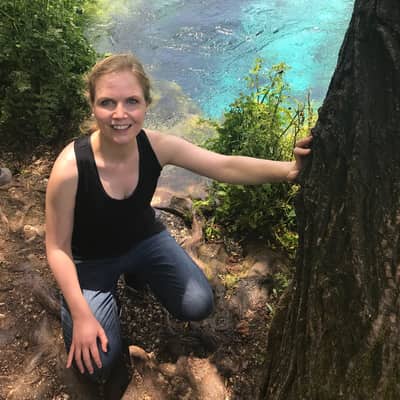
I am an Albania Tour Guide , who organizes 1-day, 2-day or multiple day private tours in Albania . I arrange your transportation and I am your English speaking guide. So that, you get to experience the most beautiful places in Albania! Kind regards, Manon

Welcome to Albania!
I am a tour guide in albania.
I am an Albania Tour Guide , who organizes 1-day, 2-day or multiple day private tours in Albania .
Book your free Albania Planning Session via Skype now, by using my online scheduler to find a time that’s convenient for you.
Stay up to date with notifications from The Independent
Notifications can be managed in browser preferences.
UK Edition Change
- UK Politics
- News Videos
- Paris 2024 Olympics
- Rugby Union
- Sport Videos
- John Rentoul
- Mary Dejevsky
- Andrew Grice
- Sean O’Grady
- Photography
- Theatre & Dance
- Culture Videos
- Food & Drink
- Health & Families
- Royal Family
- Electric Vehicles
- Car Insurance deals
- Lifestyle Videos
- UK Hotel Reviews
- News & Advice
- Simon Calder
- Australia & New Zealand
- South America
- C. America & Caribbean
- Middle East
- Politics Explained
- News Analysis
- Today’s Edition
- Home & Garden
- Broadband deals
- Fashion & Beauty
- Travel & Outdoors
- Sports & Fitness
- Sustainable Living
- Climate Videos
- Solar Panels
- Behind The Headlines
- On The Ground
- Decomplicated
- You Ask The Questions
- Binge Watch
- Travel Smart
- Watch on your TV
- Crosswords & Puzzles
- Most Commented
- Newsletters
- Ask Me Anything
- Virtual Events
- Betting Sites
- Online Casinos
- Wine Offers
Thank you for registering
Please refresh the page or navigate to another page on the site to be automatically logged in Please refresh your browser to be logged in
Albania travel guide: Everything you need to know before you go
Much overlooked in eastern europe, albania has beaches, unique history, lush sunshine and a scene low on tourists, article bookmarked.
Find your bookmarks in your Independent Premium section, under my profile
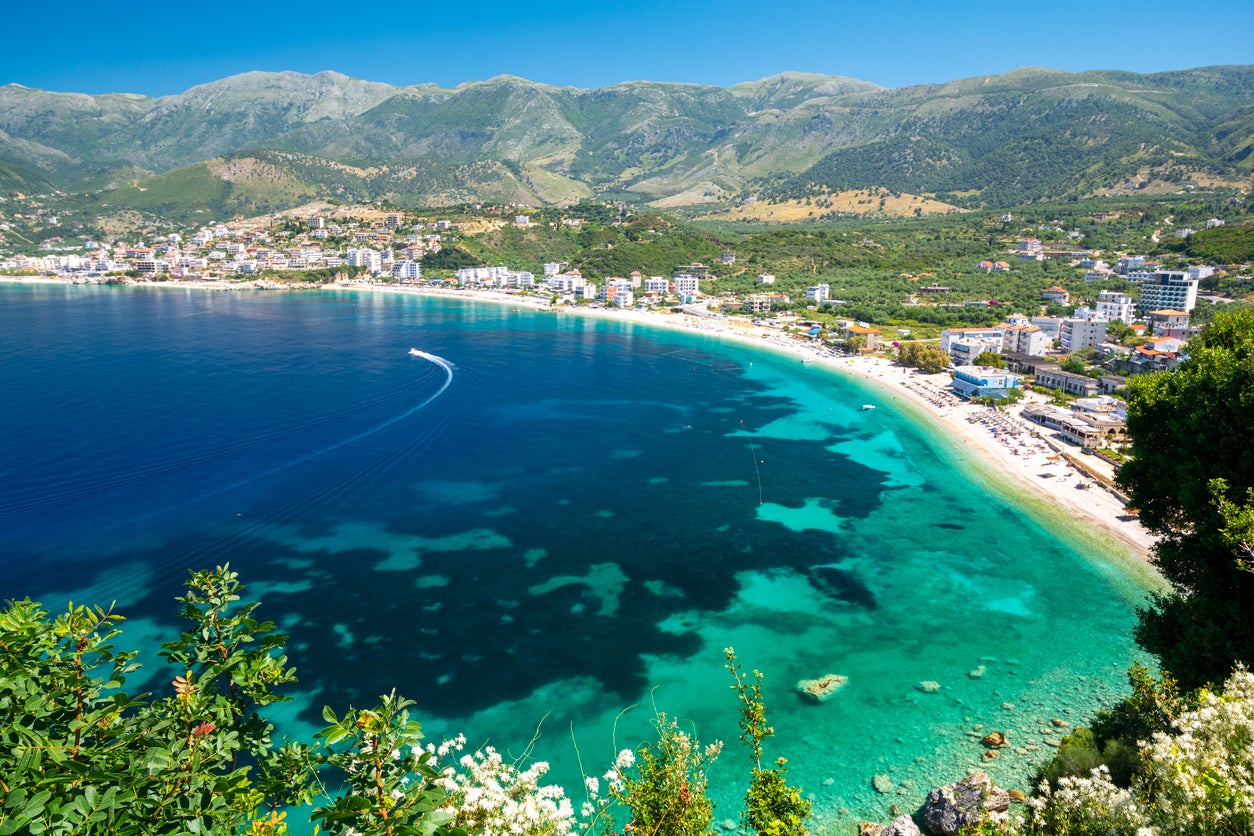
Sign up to Simon Calder’s free travel email for expert advice and money-saving discounts
Get simon calder’s travel email, thanks for signing up to the simon calder’s travel email.
Simultaneously mountainous and coastal, beloved by devoted hikers and sun-worshippers alike, on the face of it Albania seems like a cultural melting pot with Greek, Italian and Turkish influences leaving traces over the centuries. But delve a little deeper and let the Ancient Illyrian land and language reveal itself; it’s one of strength, resilience and contagious joie de vivre .
With the second largest Islamic population in Europe after Kosovo (around 60 per cent of Albanians are Muslim), the country is also the poster child for religious tolerance, with stunning mosques and cathedrals built side by side in the cities and towns of the Balkan nation. It was a stronghold of the Islamic Ottoman Empire for over 500 years and still home to some incredible architecture of the age, despite the best attempts by 20th century dictator Enver Hoxha to destroy it. A visit is sure to be met by very friendly and welcoming locals and some of the most affordable prices in the continent.
Travel restrictions and entry requirements
As of 1 May 2022, all Covid-19 related travel requirements have been lifted. Travellers no longer need to show proof of vaccination or a negative PCR test in order to enter Albania.
Best time to go
With a similarly balmy climate to neighbouring Greece, Albania is one of the sunniest countries in Europe, with sun-drenched hours peaking between April and October. The best time for hiking in the mountains are the quieter spring and autumn months, but thanks to the high altitude, summer also works if you don’t mind more crowded trails. Summer is of course the best time for exploring the beaches of the Riviera, but temperatures do soar, so if exploring the cities and Ottoman towns is high on your agenda, spring or autumn are also preferable.
- Why you should swap packed Greece for the beautiful, quieter beaches of Albania
Top regions
Tirana was a quiet inland town until the capital was moved here in 1912. The considerate 20th century town planning gifts pleasant leafy, wide streets with plenty of shade from the soaring summer heat. The city’s epicentre is the recently pedestrianised Skanderbeg Square, a grand space, home to the beautiful 18th-century Et’hem Bej Mosque, and the angular communist era Opera House and National History Museum. Around the corner, market Pazari i Ri is lined with food stalls and restaurants, but it’s Blloku you’ll want to graze in ‒ this buzzy corner of town was formerly a residential neighbourhood for the governing communist politicians, and is now a vibrant hub of cafes, bars, restaurants and clubs.
Shkoder and the Albania Alps
Established by Ancient Ilyrian tribes in the 4th century BC, Shkoder has seen some action in its time. The gateway to Albania if you’re arriving from northern Europe by bus or car, it’s a peaceful, atmospheric little city ‒ so give it some of your time, as it’s more than just a jumping off point for the mountains. Rent a bicycle and ride out to the lake, dig through the hidden flea markets and find yourself moved by Marubi National Museum of Photography. When moving on, minivans go up to Theth National Park every morning where you can try shorter, local hikes or follow the popular day-long trail to Valbonës, where vans will drive you back down to Shkoder the next afternoon.
Gjirokaster
Famous for its fantastically well preserved, sophisticated Ottoman-era architecture, the winding cobblestoned streets of Gjirokaster are Unesco-protected for good reason. Set back from the coast and nestled up in the hills, the stunning architecture of the old town was once home to one of the biggest hubs of Sufism (a mystical, meditation based school of Islam) outside of Turkey. While only a fraction of the religious sights survived Enver Hoxha’s purge, churches and mosques still live side by side here, as they have done for centuries. Gjirokaster Castle is undoubtedly one of the best in the country (competition is stiff as there are over 150) with glimmering white stone and great fortress walls.
- Tirana city guide: Where to eat, drink, shop and stay in Albania’s capital
The Riviera
The 120km coastal stretch from Vlore to Sarande known as the Albanian Riviera, comprises of picturesque hillside villages and majestic pale blue hues as the Ionian Sea laps its pebble beaches. Popular stops are festival hub Dhermi and backpacker favourite Himare, or go high end at the luxurious cluster of tiny islands in Ksamil. One highway goes along the coast, served by a handful of buses per day in either direction ‒ take this road to explore the lesser trodden beaches along the way, hiring a car or moped, or if you’re feeling brave, do as the young Albanians do and hitch-hike. The crystal clear waters of the riviera are unexpectedly cold, even in the heat of the summer, thanks to springs of water flowing out from the mountains and under the sea bed.
Underrated destinations
Berat and osumit canyon.
Just as impressive as Gjirokaster, but often overlooked in its favour, is fellow Ottoman-era town Berat. Known as the city of a thousand windows, Berat’s glass panes dazzle the viewer, from the banks of the river bend right up into the hills. The Citadel dates to the 13th century with a fantastic little Byzantine, churches inside ‒ pop to St Mary’s for show stopping mosaics. There are of course gorgeous mosques here, too ‒ Berat’s great example of the religious tolerance that Albania is so good at. Take a day trip from here to Osumit Canyon where you can wade through the river past the rock faces and scoop up mud from the riverbed to use as a nourishing face mask.
Butrint Archaeological Park
Greek, Roman and Byzantine ruins all grace this former metropolis, perched on the edge of the Riviera. Butrint is undoubtedly home to the best ruins in Albania and indeed the West Balkans but is often bypassed on the way to the beach. It’s a sprawling site with buildings dotted around the lagoon, (imagine Pompeii in the middle of a bayou), including Roman baths, a Greek amphitheatre and Venetian towers. Prepare to spend the day there and wear extremely comfortable shoes. There’s a later Ottoman addition that’s worth the hike too; infamous leader Ali Pasha built a fortress here to keep an eye on Napoleon, who’d taken nearby Corfu.
Home of Albania’s crisp local lager, Korçë is set amidst picturesque mountains and immersed in nature, yet less trodden by tourists than other parts of the country. Hiking is top of the list of things to do here, but the city is also brimming with fantastic architecture and cultural institutions. "Gjon Mili" Photography Museum gives a glimpse into 20th century life here, while the Medieval Museum, doing what it says on the tin, is one of the country’s best. The show stopping, orthodox Resurrection of Christ Cathedral gets the most attention but tiny Iliaz Bej Mirahori Mosque is also unmissable, as one of the country’s oldest.
- Why Gjirokaster is Albania’s best-kept secret
Best things to do
Take a beautiful hike.
Hiking from Theth to Valbonës, through the Albanian Alps (or the Accursed Mountains as they are sometimes called) tops everyone’s bucket list for a reason. Views this stunning rarely come on such a manageable hike ‒ and it is, with the right footwear, manageable for novice trekkers, as long as you’re able to walk 16km, which takes six to nine hours. This trip takes at least three days on an itinerary, typically with two overnights ‒ it’s a travel day each end as minivans go from Shkoder to either Theth or Valbonës every morning and back in the afternoons, with a full day of hiking in the middle.
Swim in pools and rivers
Take a cold water dip in the unusual sights of natural beauty that Albania has by the dozen. The top three are the Blue Eye, a turquoise pool of chilly mountain spring water (usually around 10-13° Celsius) en route to Gjirokaster; the aforementioned Osumi Canyon near Berat, where you can raft or water hike along the River Osum; or the most intrepid (the road from Shkoder isn’t great) will love swimming in the River Shalë, which flows inside the Albanian Alp range.
Search out the flea markets
These exist in every town and city, rarely marked on mapping apps, but ask a local where the nearest one is and you will be rewarded beyond your wildest, vintage loving dreams.
Getting around
Car or moped hire is comparatively cheap in Albania but if you prefer to use public transport, get ready to embrace a mildly mysterious but fully functional bus network that spans most corners of the country. Use local site Gjirafa to check the long distance bus times and schedules, although the service may leave a bit earlier or later, a definite go with the flow attitude needed. There’s no pre-booking app or sites, you pay the driver so have roughly the correct change ‒ prices are listed on Gjirafa usually too.
How to get there
There are regular direct flights from London to Tirana on Wizz Air, which is both the cheapest and quickest option. But there are a number of flight-free routes, too, depending on the time you have to hand. The quickest flight-free way would be to take trains to Bari in Italy (via Paris, Milan and Rome) and hop on the daily ferry over to Durres on the northern coast of Albania. Or if Balkan buses appeal more than the ferry, take the train as far as Belgrade (via Zagreb) and bus down into Shkoder from there.
Money-saving tip
Albania is remarkably cheap, compared to the majority of other European nations, but if you’re really on a shoestring, take your own tent with you and utilise one of the countless, fantastic campsites that are dotted around the length and breadth of the country.
What’s the weather like?
Albania is blessed with approximately 300 days of sunshine a year, so spring and autumn are fantastic times to go. The summer sees temperatures soar into the 40s so stick to coastal destinations in the height of July and August.
What time zone is it in?
What currency do i need.
Albanian Lek.
What language is spoken?
Albania (aka Shqipërisë ) is home to Albanians ( Shqipëri ) who speak Albanian ( Shqip ).
Join our commenting forum
Join thought-provoking conversations, follow other Independent readers and see their replies
Subscribe to Independent Premium to bookmark this article
Want to bookmark your favourite articles and stories to read or reference later? Start your Independent Premium subscription today.
New to The Independent?
Or if you would prefer:
Want an ad-free experience?
Hi {{indy.fullName}}
- My Independent Premium
- Account details
- Help centre
Update April 12, 2024
Information for u.s. citizens in the middle east.
- Travel Advisories |
- Contact Us |
- MyTravelGov |
Find U.S. Embassies & Consulates
Travel.state.gov, congressional liaison, special issuance agency, u.s. passports, international travel, intercountry adoption, international parental child abduction, records and authentications, popular links, travel advisories, mytravelgov, stay connected, legal resources, legal information, info for u.s. law enforcement, replace or certify documents.
Share this page:
Albania Travel Advisory
Travel advisory july 26, 2023, albania - level 2: exercise increased caution.
Reissued with obsolete COVID-19 page links removed.
Exercise increased caution in Albania due to crime .
Country Summary : Law enforcement’s ability to protect and assist travelers is limited in some areas, especially in remote regions. There has been targeted violence associated with illicit drug networks and organized crime countrywide. Travelers should remain aware of their surroundings and the extent of police and emergency services in their area.
Read the country information page for additional information to Albania.
If you decide to travel to Albania:
- Enroll in the Smart Traveler Enrollment Program (STEP) to receive Alerts and make it easier to locate you in an emergency.
- Follow the Department of State on Facebook and Twitter .
- Review the Country Security Report for Albania.
- Visit the CDC page for the latest Travel Health Information related to your travel.
- Prepare a contingency plan for emergency situations. Review the Traveler’s Checklist .
Travel Advisory Levels
Assistance for u.s. citizens, albania map, search for travel advisories, external link.
You are about to leave travel.state.gov for an external website that is not maintained by the U.S. Department of State.
Links to external websites are provided as a convenience and should not be construed as an endorsement by the U.S. Department of State of the views or products contained therein. If you wish to remain on travel.state.gov, click the "cancel" message.
You are about to visit:
- Company History
- Mission Statement
- Philippines
- South Africa
- Afghanistan
- American Samoa
- Antigua and Barbuda
- British Virgin Islands
- Burkina Faso
- Canary Islands
- Cayman Islands
- Central African Republic
- Christmas Island
- Cocos (Keeling) Islands
- Cook Islands
- Cote d'Ivoire
- Democratic Republic of the Congo
- Dominican Republic
- Easter Island
- El Salvador
- Equatorial Guinea
- Falkland Islands
- Faroe Islands
- French Guiana
- French Polynesia
- Guinea-Bissau
- Liechtenstein
- Madeira Islands
- Marshall Islands
- Netherlands
- New Caledonia
- New Zealand
- Norfolk Island
- North Korea
- North Macedonia
- Northern Mariana Islands
- Palestinian Territories
- Papua New Guinea
- Pitcairn Islands
- Puerto Rico
- Republic of the Congo
- Saint Barthelemy
- Saint Helena
- Saint Kitts and Nevis
- Saint Lucia
- Saint Martin
- Saint Pierre-et-Miquelon
- Saint Vincent and the Grenadines
- Sao Tome and Principe
- Saudi Arabia
- Sierra Leone
- Sint Eustatius
- Solomon Islands
- South Georgia and the South Sandwich Islands
- South Korea
- South Sudan
- Switzerland
- Trinidad and Tobago
- Turkmenistan
- Turks and Caicos Islands
- U.S. Virgin Islands
- United Arab Emirates
- United Kingdom
- United States
- Wake Island
- Western Sahara
- Travel Vaccines
- Travel Health Consultations
- Travellers’ Diarrhea Kits
- Dengue Fever Prevention
- Malaria Prevention
- Chikungunya Prevention
- Zika Prevention
- Ebola Virus
- Yellow Fever
- Hepatitis A
- Japanese Encephalitis
- Hepatitis B
- Tickborne Encephalitis (TBE)
- Tetanus-Diphtheria-Pertussis
- Measles-Mumps-Rubella
- Influenza (Flu)
- Blood Tests
- Vitamin Injections
- Physician Referral Program
- London – Euston Travel Clinic
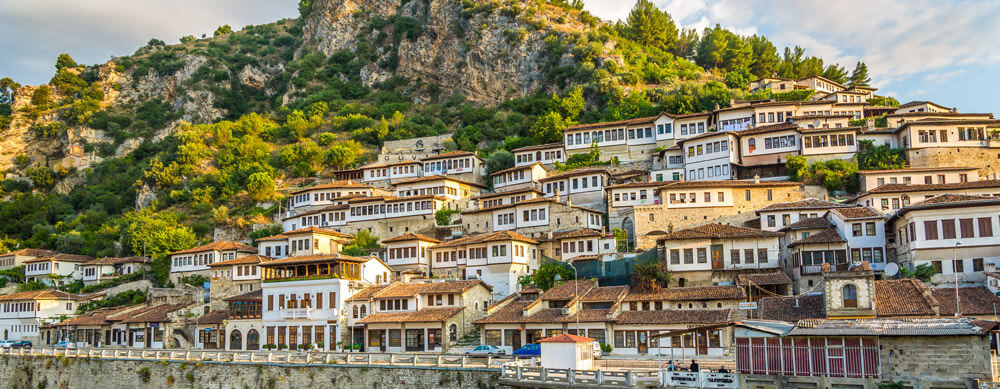
Travel Vaccines and Advice for Albania

Albania is located on the Southeastern tip of Europe’s Balkan Peninsula. The country is home to a plethora of castles and archaeological sites.
Its capital, Tirana, is on the site of the National History Museum in Skandberg Square.
The country is known for its Adriatic and Ionian coastlines and the Albanian alps.
Do I Need Vaccines for Albania?
Yes, some vaccines are recommended or required for Albania. The National Travel Health Network and Centre and WHO recommend the following vaccinations for Albania: COVID-19 , hepatitis A , hepatitis B , yellow fever , rabies , tickborne encephalitis and tetanus .
See the bullets below to learn more about some of these key immunisations:
- COVID-19 – Airborne – Recommended for all travellers
- Hepatitis A – Food & Water – Recommended for most travellers to the region, especially if unvaccinated.
- Hepatitis B – Blood & Body Fluids – Accelerated schedule available
- Tetanus – Wounds or Breaks in Skin – Recommended for travelers to most regions, especially if not previously vaccinated.
- Yellow Fever – Mosquito – Required if travelling from a country with risk of yellow fever transmission.
- Rabies – Saliva of Infected Animals – Vaccine recommended for long-stay travellers and those who may come in contact with animals.
- Tickborne Encephalitis – Ticks or Unpasteurised Products – Transmission is widespread. Spread is most common from early spring to late autumn.
See the tables below for more information:
Europe has been vigilant in its efforts to eradicate measles . But, this past March the continent saw over 500 cases of measles be reported. While Albania is not at high-risk for measles, ensure you are vaccinated.
See our vaccinations page to learn more about these infections and vaccines. Ready to protect yourself? Book your travel health appointment today by calling or schedule online now .
Do I Need a Visa to Enter Albania?
Visas are not required for stays under 90 days within a 6-month period. Passports must have at least three months validity at entry. Proof of yellow fever vaccination may be required if you are travelling from a region where yellow fever is present.
Sources: Embassy of Albania and GOV.UK
What Is the Climate Like In Albania?
The climate in Albania has hot, dry summers and cool, wet winters in its lowlands. In the highlands, the mountains are very cold from November to March and tend to have a lot of snowfall. Its Mediterranean climate is best to visit in the summer.
Tirana has a rainy period from October to June with plenty of rainfall. Winters, whilst generally mild in temperature, are very wet and can become colder at night. The summer features more intense heat with temperatures reaching 32 degrees.
The coastal climate varies little year-round. The summers are more breezy and cooler. Winters have more mild temperatures and the nights don’t see as large of a drop-in temperature.
July and August tend to be the best months to visit Albania if you want a relaxing seaside holiday.
How Safe Is Albania?
Because of its label as a European country, Albania remains at risk for terrorist attacks. Always be aware of your surroundings. If you see something suspicious, get yourself far away from the area and then report it to local police.
Public demonstrations are common and can result in violence so it is best to avoid them altogether.
Visiting the Llogora Pass
If you’re someone who loves scenic drives, then this is the place for you to visit. The road is over 1,000 meters above sea level and is in the middle of the Llogora National park. At the very top of the road, is a variety of restaurants all with scenic views. While motoring through the park, you may get to see various animals such as the golden eagle, fallow deer, and even the European wildcat.
The Llogora Pass even has a resort along the road where you can stay and enjoy the views 24/7. The winding road features spectacular views of the Ionian Coast and Albanian Riviera. The road first opened in 1920 and was officially declared a national park in 1966. All along the road you can peer down to see the beautiful villages and old, historic castles which are being reclaimed by nature.
What Should I Bring to Albania?
Albania is a beautiful destination but does need some preparation. Be sure to bring these items:
- Clothing – If you’re visiting in the wet months, bring snow or rain boots and thick socks to stay dry and warm. The summer can get very hot so bring lightweight, light colored clothing.
- Phone Case – Waterproof carrying cases come in handy for when you go to the seaside or on hikes near rivers or lakes.
Embassy of the United Kingdom in Albania
If you are in Albania and have an emergency (for example, been attacked, arrested or someone has died) contact the nearest consular services. Contact the embassy before arrival if you have additional questions on entry requirements, safety concerns or are in need of assistance.
British Embassy Tirana Rruga Skenderbeg 12 Tirana, Albania Telephone: +355 4 223 4973/4/5 Fax: +355 4 224 7697 Email: [email protected]
Stay safe abroad with Passport Health. Ring or book online now and start travelling safely today!
On This Page: What Vaccines Do I Need for Albania? Do I Need a Visa to Enter Albania? What Is the Climate Like In Albania? How Safe is Albania? Visiting the Llogora Pass What Should I Bring to Albania? Embassy of the United Kingdom in Albania

- Privacy Policy
- Automatic Data Collection Statement
The UK government finally passes bill to send migrants to Rwanda, but the battle is not over
LONDON — The British Parliament has finally passed legislation to send some migrants to Rwanda , clearing the runway for flights this summer under Prime Minister Rishi Sunak ’s controversial plan aimed at deterring risky English Channel crossings by people desperate to reach the U.K.
A bill designed to unblock a plan beset by court challenges and legislative battles was approved early Tuesday, delivering what Sunak hopes will be a much-needed political victory and fulfill his pledge to “stop the boats.”
Human rights activists and migrants’ groups have vowed to continue the fight against the policy, which they say is unethical and inhumane.
Here’s a look at the plan and what it took to reach this stage.
WHAT IS THE RWANDA PLAN?
The Rwanda plan is the British government’s response to the growing number of migrants from around the world — reaching a high of 46,000 in 2022 — who cross the English Channel from France to Britain in small boats.
Most people who arrive that way apply for asylum, and in the past many have been granted it. The Conservative government says these migrants should not be treated as genuine refugees because they did not claim asylum in another safe country, such as France, that they reached first.
In an attempt to deter people from making the risky journeys, the U.K. struck a deal with Rwanda in April 2022 to send migrants who arrive in the U.K. as stowaways or in boats to the East African country, where their asylum claims would be processed and, if successful, they would stay.
Human rights groups and other critics of the plan say it is unworkable and unethical to send migrants to a country 4,000 miles (6,400 miles) away that they don’t want to live in. No one has yet been sent to Rwanda, but Sunak has said the first flights will leave in July.
ID IT TAKE SO LONG TO REACH THIS POINT?
The Rwanda plan was immediately met with legal challenges. The first removal flight was grounded at the last moment in June 2022 after a ruling from the European Court of Human Rights,
The case ultimately reached Britain’s Supreme Court, which dealt the government a defeat in November, ruling that the policy is unlawful because Rwanda is not a safe third country where migrants can be sent. Five justices unanimously said that “the removal of the claimants to Rwanda would expose them to a real risk of ill-treatment” because they could be sent back to the home countries they had fled.
The judges said there was evidence Rwanda had a culture that misunderstood its obligations under the Refugee Convention, was dismissive toward asylum-seekers from the Middle East and Afghanistan, and had little experience of the asylum procedures needed to handle the cases of migrants from around the world.
HOW DID THE U.K. GOVERNMENT RESPOND?
Britain and Rwanda signed a treaty in December pledging to strengthen protections for migrants, partly by barring Rwanda from sending any migrants deported from the U.K back to their home countries. Sunak’s government argued the treaty allowed it to pass a law declaring Rwanda a safe destination.
The Safety of Rwanda Bill, which was passed Tuesday, pronounces the country safe , making it harder for migrants to challenge deportation and allows the British government to ignore injunctions from the European Court of Human Rights that seek to block removals.
If that fails to stop legal challenges, Sunak has said he would consider ignoring or leaving international human rights treaties including the European Convention on Human Rights. That move is backed by some members of Sunak’s governing Conservative Party, but would draw strong domestic opposition and international criticism. The only European countries that are not party to the rights convention are Belarus and Russia.
The Rwandan government insists it is “committed to its international obligations” and has been recognized by the U.N. and other international institutions “for our exemplary treatment of refugees.” Rwanda’s government says the country is ready to receive migrants from Britain, and has plans to build more than 1,000 houses, including recreational facilities, for the deportees.
HAVE OTHER COUNTRIES TRIED SIMILAR POLICIES?
Britain is not alone in trying to control irregular migration. Much of Europe and the U.S. is struggling with how best to cope with migrants seeking refuge from war, violence, oppression and a warming planet that has brought devastating drought and floods.
A few countries have tried offshore processing of asylum seekers — notably Australia, which first sent migrants to the Pacific island nation of Nauru in 2001 and has operated an asylum-processing center there since 2012.
From 2013 to 2018, Israel had a deal with Rwanda to deport African migrants, until Israel’s supreme court declared it unlawful.
Denmark has moved away from a deal with Rwanda and wants to find a solution with fellow European Union countries.
“A British or Danish solution will solve a problem for the individual country,” Danish Immigration Minister Kaare Dybvad Bek told Danish broadcaster DR Tuesday. “But we believe a unified European solution will solve more problems, because you will also stop the people smugglers who today make billions from transporting people across the Mediterranean.”
Last year, Italy reached a deal with Albania for the Balkan country to temporarily house and process some of the thousands of migrants who reach Italian shores. There is a crucial difference from the U.K. plan: it’s not a one-way trip. Successful asylum-seekers would get to start new lives in Italy, not Albania.
Jan M. Olsen in Copenhagen, Denmark contributed to this report.
Follow AP’s global migration coverage at https://apnews.com/hub/migration

- International edition
- Australia edition
- Europe edition
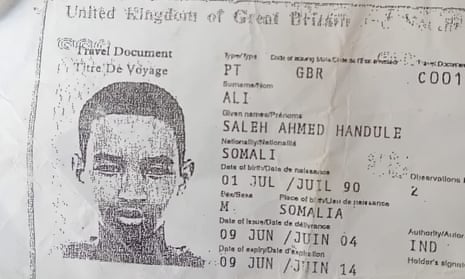
Refugee who left UK for holiday in 2008 stranded in east Africa for 16 years
Saleh Ahmed Handule Ali, now 33, had indefinite leave to remain in UK, but Home Office failed to keep a record
A refugee who left the UK on holiday as a teenager in 2008 has been stranded in east Africa for the last 16 years in a case that senior judges have described as “extraordinary”.
Saleh Ahmed Handule Ali, now 33, arrived in the UK at the age of nine in April 2000 with his mother and two younger siblings from Somalia. They came to join Ali’s father, who had been granted refugee status by the UK government. The family were also recognised as refugees by the Home Office and Ali was given a travel document in 2004 under the refugee convention, which was valid for 10 years.
In 2008 Ali was diagnosed with tuberculosis and in December of that year decided to travel to Djibouti for a short holiday in the hope that the warmer climate would aid his recovery.
At some point after arriving in Djibouti, he lost his refugee travel document and could not get back home to his family, who live in Bristol. As there is no British embassy in Djibouti, he managed to get to neighbouring Ethiopia , and when he finally reached Addis Ababa, he tried at least twice to get assistance from the embassy, without success.
It later emerged that the Home Office had failed to keep a record on its database of the fact that it had granted him indefinite leave to remain in the UK as a refugee. According to a ruling in the court of appeal last week, he has been “stranded in Ethiopia, undocumented, ever since”.
His mother, who suffers from several health conditions, saved up money for several years to engage a solicitor to try to bring her son back home.
In June 2015, a Home Office entry clearance officer refused Ali permission to return to the UK. The family appealed the first tier and in the upper tribunal of the immigration court, but their appeals were rejected.
Ali is undocumented in Ethiopia and is living a hand-to-mouth, destitute existence, unable to work. He survives on the money his mother sends him.
“I have been crying for 16 years over the loss of my son,” his mother, Shamis Dirya, told the Guardian. “We want the Home Office to bring him back to us. But they are not listening to us. When we speak on the phone, I cry and he cries. He has not had a phone for the last three months, so it has been difficult to speak to him. Sometimes we don’t even know whether he’s alive. He went to primary school here, he went to high school here. He only went to Djibouti for a short holiday.”
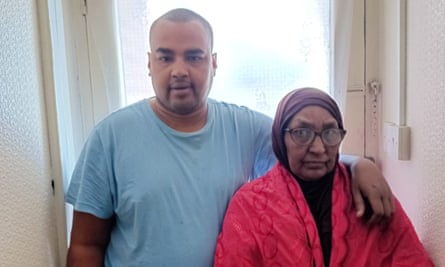
In the court of appeal, the lead judge, Lady Justice Andrews, said in the ruling by three judges: “This is by any standards and in many different respects a most extraordinary case.”
after newsletter promotion
The judgment, which granted Ali’s appeal against the refusal of his case and remitted it to the upper tribunal, was critical of the judge in the first-tier tribunal, Adam Rhys-Davies, and said that a clear error of law had been made when he rejected Ali’s case.
Referring to information coming to light in 2017 that the Home Office had no information on its system recording that Ali had been granted indefinite leave to remain in the UK, the judgment said: “Quite how this could have happened … is difficult to comprehend.”
Khalid Khashy of Pristine Law, who represents Ali, said: “Our client understandably has suffered immensely, including from mental health and destitution, whilst living in African countries of Djbouti and Ethiopia in the hope of returning to his home and family in the UK.
“Unfortunately, his ordeal is not over, as the matter is sent back to the upper tribunal for a fresh decision, which could take months. To avoid costs and delays, it is hoped that the Home Office will concede and grant him entry clearance with a sincere apology.”
A Home Office spokesperson said: “It is a matter of longstanding government policy that we do not routinely comment on individual cases.”
- Immigration and asylum
- Home Office

Macron criticises Rwanda-style asylum schemes days after UK passes bill

Don’t rescue people who scupper their Channel boats, says Reform UK deputy
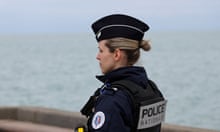
Humanitarian groups demand safe routes to UK after five deaths in Channel
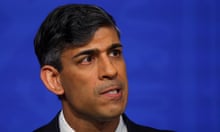
First deportation flight to Rwanda will not leave till summer, admits Sunak
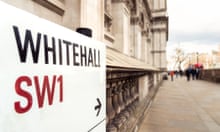
UK small boats policymakers referred to ‘bloody migrants’, says civil servant
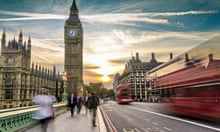
Rwanda bill further delayed after Lords again votes for changes
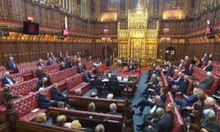
Rwanda bill delayed for at least a day after Lords pass amendments
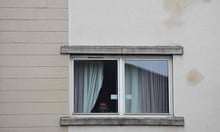
Number of asylum seekers left homeless after Home Office eviction soars
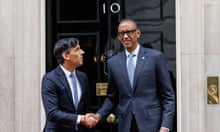
Sunak welcomes Kagame to No 10 as Rwanda scheme hits fresh snags
Most viewed.
Cookies on GOV.UK
We use some essential cookies to make this website work.
We’d like to set additional cookies to understand how you use GOV.UK, remember your settings and improve government services.
We also use cookies set by other sites to help us deliver content from their services.
You have accepted additional cookies. You can change your cookie settings at any time.
You have rejected additional cookies. You can change your cookie settings at any time.
- Defence and armed forces
PM to announce largest-ever military aid package to Ukraine on visit to Poland
Prime Minister Rishi Sunak will announce the largest-ever military aid package to Ukraine on his visit to Poland.

- PM to travel to Poland and Germany to cement security, trade and diplomatic ties with key European allies
- He is expected to announce a £500 million boost for Ukraine and largest-ever provision of vital munitions, including some 400 vehicles, 1,600 munitions and 4 million rounds of ammunition
- PM to discuss the threat from Russia and UK efforts to support European security with Prime Minister Tusk and the Nato Secretary-General in Warsaw
The Prime Minister will travel to Poland today [Tuesday 23 April] to announce a massive uplift in military support for Ukraine, including £500 million in additional military funding and our largest-ever delivery of vital equipment.
He will meet Polish Prime Minister Donald Tusk to discuss deepening UK-Poland relations, and the leaders will hold talks with NATO Secretary-General Jens Stoltenberg in Warsaw on European security and support to Ukraine. The Prime Minister will then travel on to Germany to meet Chancellor Olaf Scholz in Berlin.
Ukraine is facing an existential threat as Russia continues its barbaric invasion, risking the security and stability of all of Europe.
The £500 million additional funding announced today - which takes us to £3 billion in UK military aid for Ukraine this financial year - will be used to rapidly deliver urgently-needed ammunition, air defence, drones and engineering support. The drones will be procured in the UK and the funds will support a scale-up in domestic defence supply chains.
The Ministry of Defence will also send our largest-ever single package of equipment from the UK, designed to help push back the Russian invasion on land, sea and air. It includes:
- 60 boats including offshore raiding craft, rigid raiding craft and dive boats as well as maritime guns
- More than 1,600 strike and air defence missiles, as well as additional Storm Shadow long-range precision-guided missiles.
- More than 400 vehicles, including 160 protected mobility ‘Husky’ vehicles, 162 armoured vehicles and 78 all-terrain vehicles.
- Nearly 4 million rounds of small arms ammunition.
Prime Minister Rishi Sunak said:
“Defending Ukraine against Russia’s brutal ambitions is vital for our security and for all of Europe. If Putin is allowed to succeed in this war of aggression, he will not stop at the Polish border.
“I am in Warsaw today to deepen ties with our Polish partners and commit critical new military support for Ukraine’s defence. Ukraine’s armed forces continue to fight bravely, but they need our support – and they need it now. Today’s package will help ensure Ukraine has what they need to take the fight to Russia.
“The United Kingdom will always play its part at the forefront of European security, defending our national interest and standing by our Nato allies.”
Defence Secretary Grant Shapps said:
“This record package of military aid will give President Zelenskyy and his brave nation more of the kit they need to kick Putin out and restore peace and stability in Europe.
“The UK was the first to provide NLAW missiles, the first to give modern tanks and the first to send long-range missiles.
“Now, we are going even further. We will never let the world forget the existential battle Ukraine is fighting, and with our enduring support, they will win.”
In his first in-person meeting with new Polish Prime Minister Donald Tusk, the Prime Minister will also seek to deepen UK-Poland ties across a range of issues.
Building on existing strong defence and security cooperation, he will offer to deploy an RAF Typhoon Squadron to carry out Nato Air Policing over Poland next year.
To further boost trade and support UK companies looking to invest in Poland, the Prime Minister will also announce today an intention to triple UK Export Finance funding available for Poland from £5 billion to £15 billion – our most generous offer to a partner country to date.
Bilateral trade between the UK and Poland has doubled in the last decade to reach £30.6 billion, with 45 million bottles of Scotch whisky bought in Poland last year and UK firms bidding for £5 billion worth of Polish opportunities across energy, defence, healthcare, and infrastructure.
Share this page
The following links open in a new tab
- Share on Facebook (opens in new tab)
- Share on Twitter (opens in new tab)
Update to the UK Export Finance funding figures available for Poland.
First published.
Invasion of Ukraine
- UK visa support for Ukrainian nationals
- Move to the UK if you're coming from Ukraine
- Homes for Ukraine: record your interest
- Find out about the UK’s response
Is this page useful?
- Yes this page is useful
- No this page is not useful
Help us improve GOV.UK
Don’t include personal or financial information like your National Insurance number or credit card details.
To help us improve GOV.UK, we’d like to know more about your visit today. We’ll send you a link to a feedback form. It will take only 2 minutes to fill in. Don’t worry we won’t send you spam or share your email address with anyone.

IMAGES
VIDEO
COMMENTS
Living in Albania. Travelling to Albania. FCDO travel advice for Albania. Includes safety and security, insurance, entry requirements and legal differences.
Visa requirements. British citizens can enter and stay in Albania for a maximum of 90 days in every 6-month period without a visa. The Albanian authorities require anyone staying longer than 90 ...
Albania travel advice. FCDO travel advice for Albania. Includes safety and security, insurance, entry requirements and legal differences. Getting married or registering a civil partnership abroad ...
Call us in Washington, D.C. at 1-888-407-4747 (toll-free in the United States and Canada) or 1-202-501-4444 (from all other countries) from 8:00 a.m. to 8:00 p.m., Eastern Standard Time, Monday through Friday (except U.S. federal holidays). See the State Department's travel website for the Worldwide Caution and Travel Advisories.
Prior to travel, you should: Check the latest government guidance on the FCDO Foreign travel advice and country specific pages for travel to this country and the rules for entering the UK on return. Ensure you are up to date with UK recommendations on COVID-19 vaccination. Check if you are at increased risk of severe COVID-19.
My top travel tips for Albania to save you money, time and stress. Read this before you go travelling in Albania. When I embarked on my 6-month overland journey through the Balkan countries, Albania was definitely the country I was most nervous about visiting. I had read all about the rugged beaches, high mountains and historic towns and castles - so I had no trouble deciding where to go and ...
Bars in Albania are . Find continuously updated travel restrictions for Albania such as border, vaccination, COVID-19 testing, and quarantine requirements.
The Albanian government's current target is to vaccinate 1 million (out of 3 millions) Albanians with the first dose by June - July 2021. ... Can I travel to Albania from UK now? From 17 May, the 'Stay in the UK' regulation will cease and international travel will be allowed to restart, governed by a new traffic light system.
1. Passengers entering or transiting through Albania must have: - a COVID-19 vaccination certificate showing that they were fully vaccinated at least two weeks before arrival; or. - a negative COVID-19 rapid antigen test taken at most 48 hours before arrival; or. - a negative COVID-19 PCR test taken at most 72 hours before arrival; or.
All international travelers should be fully vaccinated against measles with the measles-mumps-rubella (MMR) vaccine, including an early dose for infants 6-11 months, according to CDC's measles vaccination recommendations for international travel. Measles (Rubeola) - CDC Yellow Book. Rabies. Albania is free of dog rabies.
Moreover, if you look at the travel advice from the UK government and the Swiss government, they advise drinking bottled water in Albania. The UK government goes as far as saying that the tap water may cause illness. And the Swiss government states that the water supply system in Albania is old and incomplete. UK Government: "The tap water in ...
Best time to go. With a similarly balmy climate to neighbouring Greece, Albania is one of the sunniest countries in Europe, with sun-drenched hours peaking between April and October. The best time ...
If you decide to travel to Albania: Enroll in the Smart Traveler Enrollment Program (STEP) to receive Alerts and make it easier to locate you in an emergency. Follow the Department of State on Facebook and Twitter. Review the Country Security Report for Albania. Visit the CDC page for the latest Travel Health Information related to your travel.
Wild Frontiers, one of the first operators to launch tours in Albania, said inquiries for its week-long guided trips - the only ones it offers below £1,000 - were up 30% on last January. Its ...
Travel forms: Biometric Card for foreign citizens: British citizens with a valid residence permit in Albania can apply for a Biometric Card, which enables registration on the e-Albania platform. To apply, buy a coupon at the nearest Albanian Post Office and visit the ALEAT office located at the Border and Migration Directorate to submit your ...
Tirana, Albania Telephone: +355 4 223 4973/4/5 Fax: +355 4 224 7697 Email: [email protected]. Stay safe abroad with Passport Health. Ring or book online now and start travelling safely today!
Albania is recasting itself as a destination for alternative travel, with its spectacular landscapes away from the coast, and friendly farm stays Helena Smith Fri 24 Feb 2023 02.00 EST Last ...
There has been a rapid increase in the number of Albanian migrants crossing the English Channel: In 2020, 50 arrived on small boats. In 2021, 800 made the crossing. In 2022, 12,301 arrived. The ...
Nearly £9 million of UK cash is being used to develop the region around Has and the town of Kukes, in the hope of dissuading people from leaving. In a recent address to his nation, Edi Rama, its ...
Read this travel advice and carry out your own research before deciding whether to travel. Emergency services in Albania. Ambulance: 127. Fire: 128. Police: 112. Contact your travel provider and ...
The Rwanda plan is the British government's response to the growing number of migrants from around the world — reaching a high of 46,000 in 2022 — who cross the English Channel from France ...
Nearly 1m UK pensioners living in deprivation, official figures show 16 Apr 2024 Angela Rayner handling house sale controversy 'in right way', says Yvette Cooper
Over 1,000 Albanian nationals have been returned since the UK-Albania joint communiqué was signed on 13 December. Milestone reached in UK-Albania agreement on illegal migration - GOV.UK Cookies ...
Labour also turns down European Commission's proposal, which would have allowed young Britons to live, study and work in EU Rishi Sunak has rejected an EU offer to strike a post-Brexit deal to ...
The survey collects information on how, why, when and where people travel. The mid-year estimates provide faster indicators for key tables.
James Cleverly travels to Kigali to sign it, becoming the third home secretary to travel to Rwanda, following in the footsteps of Braverman and Priti Patel. The British government says the new ...
A refugee who left the UK on holiday as a teenager in 2008 has been stranded in east Africa for the last 16 years in a case that senior judges have described as "extraordinary".. Saleh Ahmed ...
PM to travel to Poland and Germany to cement security, trade and diplomatic ties with key European allies; He is expected to announce a £500 million boost for Ukraine and largest-ever provision ...